

45,000+ students realised their study abroad dream with us. Take the first step today
Here’s your new year gift, one app for all your, study abroad needs, start your journey, track your progress, grow with the community and so much more.

Verification Code
An OTP has been sent to your registered mobile no. Please verify

Thanks for your comment !
Our team will review it before it's shown to our readers.

Essay on Importance of Internet: Samples for Students

- Updated on
- Jun 20, 2024

Internet is not just a need or luxury, it has become a household necessity. It was used as a source of entertainment but now it is impossible to work in offices or study without the Internet. When the global pandemic locked everyone in their house, it became an important medium to connect, study and work. Students were able to study without the risk of catching COVID-19 because of the Internet. The importance of the internet is also a common topic in various entrance exams such as SAT , TOEFL , and UPSC . In this blog, you will learn how to write an essay on the importance of the Internet.
This Blog Includes:
Tips to write the perfect essay on internet, sample 1 of essay on the importance of the internet (100 words), sample essay 2 – importance of the internet (150 words), sample essay 3 on use of internet for student (300 words).

Also Read: Essay on Yoga Day
Also Read: Speech on Yoga Day
Now the task of essay writing may not always be easy, hence candidates must always know a few tips to write the perfect essay. Mentioned below are a few tips for writing the correct essay:
- Prepare a basic outline to make sure there is continuity and relevance and no break in the structure of the essay
- Follow a given structure. Begin with an introduction then move on to the body which should be detailed and encapsulate the essence of the topic and finally the conclusion for readers to be able to comprehend the essay in a certain manner
- Students can also try to include solutions in their conclusion to make the essay insightful and lucrative to read.
Also Read: UPSC Essay Topics
The last few years have witnessed heavy reliance on the Internet. This has been because of multiple advantages that it has to offer – for instance, reducing work stress and changing the face of communication most importantly. If we take the current scenario, we cannot ignore how important the Internet is in our everyday lives. It is now indeed a challenging task to visualize a world without the internet. One may define the internet as a large library composed of stuff like – records, pictures, websites, and pieces of information. Another sector in which the internet has an undeniably important role to play is the field of communication. Without access to the internet, the ability to share thoughts and ideas across the globe would have also been just a dream.
Also Read: IELTS Essay Topics
With the significant progress in technology, the importance of the internet has only multiplied with time. The dependence on the internet has been because of multiple advantages that it has to offer – for instance, reducing work stress and changing the face of communication most importantly. By employing the correct usage of the internet, we can find various information about the world. The internet hosts Wikipedia, which is considered to be one of the largest best-composed reference books kept up by a vast community of volunteer scholars and editors from all over the world. Through the internet, one may get answers to all their curiosity.
In the education sector too, it plays a major role, especially taking into consideration the pandemic. The Internet during the pandemic provided an easy alternative to replace the traditional education system and offers additional resources for studying, students can take their classes in the comforts of their homes. Through the internet, they can also browse for classes – lectures at no extra cost. The presence of the Internet is slowly replacing the use of traditional newspapers. It offers various recreational advantages as well. It can be correctly said that the internet plays a great role in the enhancement of quality of life.
Also Read: TOEFL Sample Essays
One may correctly define the 21st century as the age of science and technology. However, this has been possible not only by the efforts of the current generation but also by the previous generation. The result of one such advancement in the field of science and technology is the Internet. What is the Internet? So the internet can be called a connected group of networks that enable electronic communication. It is considered to be the world’s largest communication connecting millions of users.
The dependence on the internet has been because of multiple advantages that it has to offer – for instance, reducing work stress and changing the face of communication most importantly. Given the current scenario, the Internet has become a massive part of our daily lives, and it is now a challenging task to imagine the world without the Internet. The importance of the Internet in the field of communication definitely cannot be ignored.
Without access to the internet, the ability to share thoughts and ideas across the globe would have been just a dream. Today we can talk to people all over the globe only because of services like email, messenger, etc that are heavily reliant on the internet. Without the internet, it would be hard to imagine how large the world would be. The advent of the internet has made the task of building global friendships very easy.
The youth is mainly attracted by entertainment services. Streaming platforms like Amazon , Netflix, and YouTube have also gained immense popularity among internet users over the past few years. The presence of the Internet is slowly replacing the use of traditional newspapers among people too.
In addition to these, it has various recreational advantages to offer as well. For instance, people can search for fun videos to watch and play games online with friends and other people all over the globe. Hence, we can say the internet holds immense importance in today’s era. Internet technology has indeed changed the dynamics of how we communicate, respond or entertain ourselves. Its importance in everyday life is never-ending. It can be correctly said that the internet plays a great role in the enhancement of quality of life. In the future too, we will see further changes in technology .
Also Read: SAT to Drop Optional Essays and Subject Tests from the Exam
Related Articles
| Essay on Child Labour | |
The internet provides us with facts and data, as well as information and knowledge, to aid in our personal, social, and economic development. The internet has various applications; nevertheless, how we utilize it in our daily lives is determined by our particular needs and ambitions.
Here are five uses of the internet: email; sharing of files; watching movies and listening to songs; research purposes; and education.
The Internet has also altered our interactions with our families, friends, and life partners. Everyone is now connected to everyone else in a more simplified, accessible, and immediate manner; we can conduct part of our personal relationships using our laptops, smartphones, and tablets.
This was all about an essay on importance of Internet. The skill of writing an essay comes in handy when appearing for standardized language tests. Thinking of taking one soon? Leverage Live provides the best online test prep for the same. Register today to know more!
Nikita Puri
Nikita is a creative writer and editor, who is always ready to learn new skills. She has great knowledge about study abroad universities, researching and writing blogs about them. Being a perfectionist, she has a habit of keeping her tasks complete on time before the OCD hits her. When Nikita is not busy working, you can find her eating while binge-watching The office. Also, she breathes music. She has done her bachelor's from Delhi University and her master's from Jamia Millia Islamia.
Leave a Reply Cancel reply
Save my name, email, and website in this browser for the next time I comment.
Contact no. *
Thank you! Watch our space for more informative blogs!
Thank you very much ! This helped me to write about internet .

Leaving already?
8 Universities with higher ROI than IITs and IIMs
Grab this one-time opportunity to download this ebook
Connect With Us
45,000+ students realised their study abroad dream with us. take the first step today..

Resend OTP in

Need help with?
Study abroad.
UK, Canada, US & More
IELTS, GRE, GMAT & More
Scholarship, Loans & Forex
Country Preference
New Zealand
Which English test are you planning to take?
Which academic test are you planning to take.
Not Sure yet
When are you planning to take the exam?
Already booked my exam slot
Within 2 Months
Want to learn about the test
Which Degree do you wish to pursue?
When do you want to start studying abroad.
September 2024
January 2025
What is your budget to study abroad?

How would you describe this article ?
Please rate this article
We would like to hear more.
- Engineering
- Write For Us
- Privacy Policy

Essay on Internet

Here we have shared the Essay on Internet in detail so you can use it in your exam or assignment of 150, 250, 400, 500, or 1000 words.
You can use this Essay on Internet for any assignment or project whether you are in school (class 10th or 12th), college, or preparing for answer writing in competitive exams.
Topics covered in this article.
Essay on Internet in 150 words
Essay on internet in 250-400 words, essay on internet in 500-1000 words.
The Internet has revolutionized communication, information access, and business operations. It connects people globally, enabling faster and more convenient communication through email, instant messaging, and social media. It democratizes information, providing vast knowledge and resources at our fingertips. The Internet has also transformed businesses, allowing them to reach a global customer base through e-commerce. However, challenges like online privacy and the digital divide remain. Privacy concerns require protection measures, and efforts are needed to bridge the gap in Internet access based on geography and socioeconomic factors. Despite these challenges, the Internet continues to shape our lives, offering immense potential for positive change and advancement. It is a powerful tool that connects people, empowers individuals with knowledge, and provides opportunities for businesses to thrive in the digital era.
The Internet has become an indispensable part of our lives, transforming the way we communicate, access information, and conduct business. It is a vast network of interconnected computers and servers that enables the sharing and exchange of data worldwide.
One of the most significant impacts of the Internet is its ability to revolutionize communication. With the advent of email, instant messaging, and social media platforms, communication has become faster, more convenient, and more accessible. People can connect with each other instantly, regardless of geographical distances. Social media platforms have also provided new avenues for individuals to express themselves, share ideas, and build virtual communities.
Moreover, the Internet has democratized access to information. With a few clicks, anyone can access a wealth of knowledge on almost any topic. Online libraries, databases, and search engines have made information easily accessible, empowering individuals to learn, research, and stay informed. This unprecedented access to information has transformed education, enabling online learning platforms and resources to reach learners across the globe.
In addition to communication and information access, the Internet has revolutionized business operations. E-commerce has witnessed significant growth, allowing businesses to reach a global customer base and conduct transactions online. Online platforms have opened up new opportunities for entrepreneurship and innovation, enabling small businesses to thrive and compete on a global scale.
However, the Internet also poses challenges. Online privacy and security have become major concerns, with the risk of data breaches, identity theft, and cybercrime. Safeguarding personal information and practicing responsible online behavior is essential to protect oneself in the digital realm.
Furthermore, the digital divide remains a significant issue. While the Internet has connected billions of people worldwide, there are still disparities in access based on geography, income, and socioeconomic factors. Bridging this divide is crucial to ensure equal opportunities for all.
In conclusion, the Internet has revolutionized communication, information access, and business operations. It has connected people globally, democratized knowledge, and opened up new opportunities. However, challenges like online privacy and the digital divide need to be addressed. The Internet is a powerful tool that has transformed our lives and society, and its continued advancement requires responsible use and efforts to ensure inclusivity and security in the digital age.
Title: The Internet – Connecting the World in the Digital Age
Introduction :
The Internet has emerged as one of the most transformative technologies in human history. It has revolutionized communication, transformed information access, and reshaped the way we conduct business. This essay explores the origins and evolution of the Internet, its impact on communication and information access, the role of the Internet in business and entrepreneurship, as well as its social and cultural implications.
Origins and Evolution of the Internet
The Internet’s origins can be traced back to the 1960s when it was developed as a research project by the United States Department of Defense. Initially known as ARPANET, it was designed to create a decentralized network that could withstand a nuclear attack. Over time, the Internet expanded beyond its military origins, becoming a global network of interconnected computers and servers.
Communication Revolution
The Internet has transformed communication, making it faster, more convenient, and more accessible than ever before. Email, instant messaging, and social media platforms have revolutionized the way people connect and interact. Distance is no longer a barrier, and individuals can communicate in real time across continents. Social media platforms, such as Facebook, Twitter, and Instagram, have provided new avenues for self-expression, networking, and building virtual communities.
Information Access and Knowledge Sharing
The Internet has democratized access to information, fundamentally changing the way we seek and share knowledge. Online libraries, databases, and search engines have made a vast amount of information easily accessible to anyone with an Internet connection. Websites, blogs, and online forums serve as platforms for individuals to share their expertise, experiences, and opinions. Online educational platforms have also emerged, offering courses and resources that reach learners across the globe, revolutionizing education and lifelong learning.
The Internet and Business
The Internet has transformed the business landscape, offering new opportunities and challenges. E-commerce has witnessed tremendous growth, allowing businesses to reach a global customer base and conduct transactions online. Online marketplaces, such as Amazon and eBay, have revolutionized retail, providing convenience and variety to consumers. Moreover, the Internet has enabled small businesses and entrepreneurs to compete on a global scale, as they can establish an online presence and reach customers without the need for physical storefronts.
Entrepreneurship and Innovation
The Internet has fueled entrepreneurship and innovation, empowering individuals to turn their ideas into viable businesses. Online platforms and marketplaces have facilitated the launch of startups, creating a fertile ground for innovation and creativity. Crowdfunding platforms have democratized access to funding, allowing entrepreneurs to secure capital from a global community of investors. The Internet has also facilitated collaboration and knowledge sharing among entrepreneurs, enabling them to learn from each other and form strategic partnerships.
Social and Cultural Implications
The Internet has had profound social and cultural implications. It has connected people from diverse backgrounds and cultures, fostering a global exchange of ideas and perspectives. Social media has become a powerful tool for social and political movements, enabling grassroots activism and mobilization. However, the Internet has also given rise to challenges such as cyberbullying, misinformation, and the erosion of privacy. Society is grappling with issues related to digital citizenship, online ethics, and the balance between freedom of expression and responsible behavior.
Conclusion :
The Internet has revolutionized communication, transformed information access, and reshaped the business landscape. It has connected people globally, facilitated knowledge sharing, and fostered entrepreneurship and innovation. However, challenges related to privacy, cybersecurity, and the digital divide remain. As the Internet continues to evolve, it is crucial to strike a balance between the opportunities it presents and the responsibilities it entails. The Internet has become an integral part of our lives, and navigating its impact requires thoughtful engagement, ethical practices, and continuous adaptation to the ever-changing digital landscape.
Related Articles More From Author
What is pharmacognosy, essay on community service, essay on plagiarism.
- School Guide
- English Grammar Free Course
- English Grammar Tutorial
- Parts of Speech
- Figure of Speech
- Tenses Chart
- Essay Writing
- Email Writing
- NCERT English Solutions
- English Difference Between
- SSC CGL English Syllabus
- SBI PO English Syllabus
- SBI Clerk English Syllabus
- IBPS PO English Syllabus
- IBPS CLERK English Syllabus
800 Words Essay On Internet in English for Students
The internet has transformed the world in ways that were unimaginable just a few decades ago. It has revolutionized how we communicate, access information, conduct business, and even how we entertain ourselves. The internet has become an integral part of our daily lives, and it’s hard to imagine a world without it.
At its core, the Internet is a vast network of interconnected computers and servers that allows for the exchange of information and data across the globe. It was originally conceived as a way for researchers and scientists to share information and collaborate on projects, but it has since evolved into a ubiquitous platform that has permeated every aspect of modern life.
One of the most significant impacts of the internet has been on communication. Before the internet, communication was limited by geography and time zones. People had to rely on physical mail, telephone calls, or face-to-face meetings to communicate with one another. The internet has made communication instantaneous and borderless. With the rise of email, instant messaging, video conferencing, and social media platforms, people can communicate with each other from anywhere in the world, at any time.
The internet has also revolutionized the way we access information. In the past, people had to rely on physical libraries, books, and other printed materials to access information. Today, with the internet, a wealth of information is available at our fingertips. From online encyclopedias to news websites, academic journals, and online databases, the internet has made it possible to access information on virtually any topic imaginable.
Another significant impact of the internet has been on the economy and the way we conduct business. The rise of e-commerce has made it possible for businesses to reach a global market and sell their products and services online. Online shopping has become increasingly popular, and many traditional brick-and-mortar stores have had to adapt to this new reality by establishing an online presence.
Furthermore, the internet has enabled the rise of the gig economy, where people can work as freelancers or contractors for multiple clients and projects simultaneously. This has created new opportunities for individuals to earn a living and has allowed businesses to access a global talent pool.
The internet has also had a profound impact on education. Online learning platforms and distance education programs have made it possible for students to access educational resources and attend classes from anywhere in the world. This has opened up new opportunities for people who may not have had access to traditional educational institutions due to geographical or financial constraints.
However, the internet has also brought with it a number of challenges and concerns. One of the biggest concerns is privacy and security. With so much personal information being shared online, there is a risk of data breaches and cyber attacks. Companies and individuals need to be vigilant about protecting their personal information and implementing strong cybersecurity measures.
Another concern is the spread of misinformation and fake news. The internet has made it easier for anyone to publish and share information, regardless of its accuracy or credibility. This has led to the proliferation of fake news and conspiracy theories, which can have serious consequences for individuals and society as a whole.
There is also concern about the impact of the internet on mental health and well-being. The constant exposure to social media and the pressure to curate a perfect online persona can lead to feelings of anxiety, depression, and low self-esteem. Additionally, the addictive nature of the internet and the constant stream of information can contribute to decreased attention spans and difficulty focusing on tasks.
Despite these challenges, the internet has proven to be an invaluable tool that has transformed the way we live, work, and interact with the world around us. It has opened up new opportunities for communication, education, and economic growth, and has made it possible for people to connect and collaborate in ways that were previously unimaginable.
As we move forward, it is important to address the challenges and concerns surrounding the internet while also embracing its potential for innovation and progress. This may involve implementing stronger cybersecurity measures, promoting digital literacy and critical thinking skills, and encouraging responsible and ethical use of the internet.
In conclusion, the internet has had a profound impact on virtually every aspect of modern life. It has revolutionized communication, education, business, and access to information. While it has brought with it a number of challenges and concerns, the internet has proven to be an invaluable tool that has transformed the way we live and interact with the world around us. As we continue to navigate the digital age, it is important to embrace the opportunities that the internet provides while also addressing its challenges and promoting responsible and ethical use.
Uses of Internet
In the 21st century, the internet has become an indispensable part of our daily lives, revolutionizing the way we connect, learn, work, and entertain ourselves. Its multifaceted uses have permeated every aspect of society, bringing about unprecedented convenience and opportunities.
Communication stands out as one of the internet’s most significant uses. Instant messaging, video calls, and social media platforms have transcended geographical barriers, allowing people to stay connected with friends and family across the globe. The internet has turned the world into a global village, fostering a sense of unity and understanding among diverse cultures.
Education has undergone a remarkable transformation due to the internet. Online courses, tutorials, and educational resources have made learning accessible to anyone with an internet connection. Students can pursue degrees, acquire new skills, and access a wealth of information at their fingertips, democratizing education and breaking down traditional barriers to learning.
The internet has also redefined the way we work. Remote collaboration tools, cloud computing, and virtual offices have become essential components of the modern workplace. This shift has not only increased efficiency but has also opened up new opportunities for freelancers and remote workers, contributing to the rise of the gig economy.
In the realm of information, the internet has become an unparalleled resource. Search engines allow us to access vast amounts of information on any topic imaginable. This democratization of information has empowered individuals, encouraging critical thinking and facilitating informed decision-making.
Entertainment has undergone a digital revolution, with streaming services, online gaming, and social media platforms providing endless avenues for amusement. The internet has not only transformed how we consume content but has also given rise to new forms of artistic expression and creativity.
In conclusion, the internet’s uses are multifaceted and far-reaching, impacting every facet of our lives. From connecting people across the globe to revolutionizing education, work, and entertainment, the internet continues to be a transformative force, shaping the present and influencing the future. As we navigate the digital landscape, it is essential to harness the potential of the internet responsibly, ensuring that it remains a force for positive change in the years to come.
Convenience Due to Internet
The advent of the internet has ushered in an era of unprecedented convenience, transforming the way we live, work, and interact with the world. In our fast-paced lives, the internet has become a cornerstone of efficiency and ease, offering a multitude of conveniences that have reshaped our daily routines.
Communication is perhaps the most obvious and impactful convenience brought about by the internet. Instant messaging, email, and social media platforms have revolutionized the way we connect with others. Whether it’s staying in touch with loved ones, collaborating with colleagues, or reaching out to friends across the globe, the internet has made communication instantaneous and seamless.
The convenience of online shopping has fundamentally altered the retail landscape. With just a few clicks, consumers can browse, compare prices, and purchase a vast array of products from the comfort of their homes. The rise of e-commerce platforms has not only made shopping more convenient but has also introduced the concept of doorstep delivery, saving time and eliminating the need for physical store visits.
Information retrieval has been transformed by the internet’s vast repository of knowledge. Search engines provide instant access to information on any conceivable topic, enabling users to quickly find answers, conduct research, and stay informed. This ease of information retrieval has empowered individuals, making knowledge more accessible than ever before.
The workplace has undergone a paradigm shift with the internet, enabling remote work and flexible schedules. Online collaboration tools, cloud computing, and virtual communication platforms have made it possible for individuals to work from virtually anywhere, reducing the constraints of traditional office settings and commuting.
Entertainment has also become infinitely more convenient through streaming services, online gaming, and digital media platforms. The ability to access a diverse range of content on-demand has given consumers unprecedented control over their entertainment choices, eliminating the need to adhere to fixed schedules or physical media.
In conclusion, the internet has woven a tapestry of convenience into the fabric of our lives. From streamlined communication and effortless online shopping to boundless information access and flexible work arrangements, the conveniences offered by the internet have become integral to our modern existence. As we navigate this digital landscape, the ongoing evolution of internet technologies continues to enhance and redefine the meaning of convenience in our interconnected world.
Also Read: Rabindranath Tagore Essay in English For Students 500+ Words Essay on Mother Teresa in English For Students Pandit Jawaharlal Nehru Essay in English For Students APJ Abdul Kalam Essay For Students: Check 500 Words Essay
Essay On Internet- FAQs
What is internet short essay.
In the modern time, internet has become is one of the most powerful and interesting tools all across the world. The Internet is a network of networks and collection of many services and resources which benefits us in various ways. Using internet we can access World Wide Web from any place.
What is Internet in 150 words?
The internet is the most recent man-made creation that connects the world. The world has narrowed down after the invention of the internet. It has demolished all boundaries, which were the barriers between people and has made everything accessible. The internet is helpful to us in different ways.
What is internet 100 words?
A. The internet, a recent man-made marvel, has brought the world closer. It has shattered all barriers and made everything accessible. The internet serves us in countless ways, from sharing information with people across the world to staying connected with our loved ones.
Please Login to comment...
Similar reads.
- School English
- English Blogs
- California Lawmakers Pass Bill to Limit AI Replicas
- Best 10 IPTV Service Providers in Germany
- Python 3.13 Releases | Enhanced REPL for Developers
- IPTV Anbieter in Deutschland - Top IPTV Anbieter Abonnements
- Content Improvement League 2024: From Good To A Great Article
Improve your Coding Skills with Practice
What kind of Experience do you want to share?
Technology to defeat Ebola
Mathematics for a sustainable world, openmind books, scientific anniversaries, what is the purpose of music, featured author, latest book, how the internet has changed everyday life, what happened.
The Internet has turned our existence upside down. It has revolutionized communications, to the extent that it is now our preferred medium of everyday communication. In almost everything we do, we use the Internet. Ordering a pizza, buying a television, sharing a moment with a friend, sending a picture over instant messaging. Before the Internet, if you wanted to keep up with the news, you had to walk down to the newsstand when it opened in the morning and buy a local edition reporting what had happened the previous day. But today a click or two is enough to read your local paper and any news source from anywhere in the world, updated up to the minute.
The Internet itself has been transformed. In its early days—which from a historical perspective are still relatively recent—it was a static network designed to shuttle a small freight of bytes or a short message between two terminals; it was a repository of information where content was published and maintained only by expert coders. Today, however, immense quantities of information are uploaded and downloaded over this electronic leviathan, and the content is very much our own, for now we are all commentators, publishers, and creators.
In the 1980s and 1990s, the Internet widened in scope to encompass the IT capabilities of universities and research centers, and, later on, public entities, institutions, and private enterprises from around the world. The Internet underwent immense growth; it was no longer a state-controlled project, but the largest computer network in the world, comprising over 50,000 sub-networks, 4 million systems, and 70 million users.
The emergence of web 2.0 in the first decade of the twenty-first century was itself a revolution in the short history of the Internet, fostering the rise of social media and other interactive, crowd-based communication tools.
The Internet was no longer concerned with information exchange alone: it was a sophisticated multidisciplinary tool enabling individuals to create content, communicate with one another, and even escape reality. Today, we can send data from one end of the world to the other in a matter of seconds, make online presentations, live in parallel “game worlds,” and use pictures, video, sound, and text to share our real lives, our genuine identity. Personal stories go public; local issues become global.
The rise of the Internet has sparked a debate about how online communication affects social relationships. The Internet frees us from geographic fetters and brings us together in topic-based communities that are not tied down to any specific place. Ours is a networked, globalized society connected by new technologies. The Internet is the tool we use to interact with one another, and accordingly poses new challenges to privacy and security.
Information technologies have wrought fundamental change throughout society, driving it forward from the industrial age to the networked era. In our world, global information networks are vital infrastructure—but in what ways has this changed human relations? The Internet has changed business, education, government, healthcare, and even the ways in which we interact with our loved ones—it has become one of the key drivers of social evolution.
The changes in social communication are of particular significance. Although analogue tools still have their place in some sectors, new technologies are continuing to gain ground every day, transforming our communication practices and possibilities—particularly among younger people. The Internet has removed all communication barriers. Online, the conventional constraints of space and time disappear and there is a dizzyingly wide range of communicative possibilities. The impact of social media applications has triggered discussion of the “new communication democracy.”
The development of the Internet today is being shaped predominantly by instant, mobile communications. The mobile Internet is a fresh revolution. Comprehensive Internet connectivity via smartphones and tablets is leading to an increasingly mobile reality: we are not tied to any single specific device, and everything is in the cloud.
People no longer spend hours gazing at a computer screen after work or class; instead, they use their mobile devices to stay online everywhere, all the time.
Anyone failing to keep abreast of this radical change is losing out on an opportunity.
Communication Opportunities Created by the Internet
The Internet has become embedded in every aspect of our day-to-day lives, changing the way we interact with others. This insight struck me when I started out in the world of social media. I created my first social network in 2005, when I was finishing college in the United States—it had a political theme. I could already see that social media were on the verge of changing our way of communicating, helping us to share information by opening up a new channel that cuts across conventional ones.
That first attempt did not work out, but I learned from the experience.I get the feeling that in many countries failure is punished too harshly—but the fact is, the only surefire way of avoiding failure is to do nothing at all. I firmly believe that mistakes help you improve; getting it wrong teaches you how to get it right. Creativity, hard work, and a positive attitude will let you achieve any goal.
In 2006, after I moved to Spain, I created Tuenti. Tuenti (which, contrary to widespread belief, has nothing to do with the number 20; it is short for “tu entidad,” the Spanish for “your entity”) is a social communication platform for genuine friends. From the outset, the idea was to keep it simple, relevant, and private. That’s the key to its success.
I think the real value of social media is that you can stay in touch from moment to moment with the people who really matter to you. Social media let you share experiences and information; they get people and ideas in touch instantly, without frontiers. Camaraderie, friendship, and solidarity—social phenomena that have been around for as long as humanity itself—have been freed from the conventional restrictions of space and time and can now thrive in a rich variety of ways.
Out of all the plethora of communication opportunities that the Internet has opened up, I would highlight the emergence of social media and the way they have intricately melded into our daily lives. Social media have changed our personal space, altering the way we interact with our loved ones, our friends, and our sexual partners; they have forced us to rethink even basic daily processes like studying and shopping; they have affected the economy by nurturing the business startup culture and electronic commerce; they have even given us new ways to form broad-based political movements.
The Internet and Education
The Internet has clearly impacted all levels of education by providing unbounded possibilities for learning. I believe the future of education is a networked future. People can use the Internet to create and share knowledge and develop new ways of teaching and learning that captivate and stimulate students’ imagination at any time, anywhere, using any device. By connecting and empowering students and educators, we can speed up economic growth and enhance the well-being of society throughout the world. We should work together, over a network, to build the global learning society.
The network of networks is an inexhaustible source of information. What’s more, the Internet has enabled users to move away from their former passive role as mere recipients of messages conveyed by conventional media to an active role, choosing what information to receive, how, and when. The information recipient even decides whether or not they want to stay informed.
We have moved on from scattergun mass communication to a pattern where the user proactively selects the information they need.
Students can work interactively with one another, unrestricted by physical or time constraints. Today, you can use the Internet to access libraries, encyclopedias, art galleries, news archives, and other information sources from anywhere in the world: I believe this is a key advantage in the education field. The web is a formidable resource for enhancing the process of building knowledge.
I also believe the Internet is a wonderful tool for learning and practicing other languages—this continues to be a critical issue in many countries, including Spain, and, in a globalized world, calls for special efforts to improve.
The Internet, in addition to its communicative purposes, has become a vital tool for exchanging knowledge and education; it is not just an information source, or a locus where results can be published, it is also a channel for cooperating with other people and groups who are working on related research topics.
The Internet and Privacy and Security
Another key issue surrounding Internet use is privacy. Internet users are becoming more sensitive to the insight that privacy is a must-have in our lives.
Privacy has risen near the top of the agenda in step with an increasing awareness of the implications of using social media. Much of the time, people started to use social media with no real idea of the dangers, and have wised up only through trial and error—sheer accident, snafus, and mistakes. Lately, inappropriate use of social media seems to hit the headlines every day. Celebrities posting inappropriate comments to their profiles, private pictures and tapes leaked to the Internet at large, companies displaying arrogance toward users, and even criminal activities involving private-data trafficking or social media exploitation.
All this shows that—contrary to what many people seem to have assumed—online security and privacy are critical, and, I believe, will become even more important going forward. And, although every user needs privacy, the issue is particularly sensitive for minors—despite attempts to raise their awareness, children still behave recklessly online.
I have always been highly concerned about privacy. On Tuenti, the default privacy setting on every user account is the highest available level of data protection. Only people the user has accepted as a “friend” can access their personal details, see their telephone number, or download their pictures. This means that, by default, user information is not accessible to third parties. In addition, users are supported by procedures for reporting abuse. Any user can report a profile or photograph that is abusive, inappropriate, or violates the terms of use: action is taken immediately. Security and privacy queries are resolved within 24 hours.
We need to be aware that different Internet platforms provide widely different privacy experiences. Some of them are entirely open and public; no steps whatsoever are taken to protect personal information, and all profiles are indexable by Internet search engines.
On the other hand, I think the debate about whether social media use should be subject to an age requirement is somewhat pointless, given that most globally active platforms operate without age restrictions. The European regulatory framework is quite different from the United States and Asian codes. Companies based in Europe are bound by rigorous policies on privacy and underage use of social media. This can become a competitive drawback when the ground rules do not apply equally to all players—our American and Japanese competitors, for instance, are not required to place any kind of age constraint on access.
Outside the scope of what the industry or regulators can do, it is vital that users themselves look after the privacy of their data. I believe the information is the user’s property, so the user is the only party entitled to control the collection, use, and disclosure of any information about him or herself. Some social networks seem to have forgotten this fact—they sell data, make it impossible to delete an account, or make it complex and difficult to manage one’s privacy settings. Everything should be a lot simpler and more transparent.
Social networks should continue to devote intense efforts to developing self-regulation mechanisms and guidelines for this new environment of online coexistence to ensure that user information is safe: the Internet should be a space for freedom, but also for trust. The main way of ensuring that social media are used appropriately is awareness. But awareness and user education will be of little use unless it becomes an absolute requirement that the privacy of the individual is treated as a universal value.
The Internet and Culture
As in the sphere of education, the development of information and communication technologies and the wide-ranging effects of globalization are changing what we are, and the meaning of cultural identity. Ours is a complex world in which cultural flows across borders are always on the rise. The concepts of space, time, and distance are losing their conventional meanings. Cultural globalization is here, and a global movement of cultural processes and initiatives is underway.
Again, in the cultural arena, vast fields of opportunity open up thanks to online tools. The possibilities are multiplied for disseminating a proposal, an item of knowledge, or a work of art. Against those doomsayers who warn that the Internet is harming culture, I am radically optimistic. The Internet is bringing culture closer to more people, making it more easily and quickly accessible; it is also nurturing the rise of new forms of expression for art and the spread of knowledge. Some would say, in fact, that the Internet is not just a technology, but a cultural artifact in its own right.
In addition to its impact on culture itself, the Internet is enormously beneficial for innovation, which brings progress in all fields of endeavor—the creation of new goods, services, and ideas, the advance of knowledge and society, and increasing well-being.
The Internet and Personal Relationships
The Internet has also changed the way we interact with our family, friends, and life partners. Now everyone is connected to everyone else in a simpler, more accessible, and more immediate way; we can conduct part of our personal relationships using our laptops, smart phones, and tablets.
The benefits of always-online immediate availability are highly significant. I would find a long-distance relationship with my life partner or my family unthinkable without the communication tools that the network of networks provides me with. I’m living in Madrid, but I can stay close to my brother in California. For me, that is the key plus of the Internet: keeping in touch with the people who really matter to me.
As we have seen, the Internet revolution is not just technological; it also operates at a personal level, and throughout the structure of society. The Internet makes it possible for an unlimited number of people to communicate with one another freely and easily, in an unrestricted way.
Just a century ago, this was unimaginable. An increasing number of couples come together, stay together, or break up with the aid—or even as a consequence—of social communication tools. There are even apps and social networks out there that are purposely designed to help people get together for sex.
Of course, when compared to face-to-face communication, online communication is severely limited in the sense impressions it can convey (an estimated 60 to 70 percent of human communication takes place nonverbally), which can lead to misunderstandings and embarrassing situations—no doubt quite a few relationships have floundered as a result. I think the key is to be genuine, honest, and real at all times, using all the social media tools and their many advantages. Let’s just remember that a liar and a cheat online is a liar and a cheat offline too.
The Internet and Social and Political Activism
Even before the emergence of social media, pioneering experiments took place in the political sphere—like Essembly , a project I was involved in. We started to create a politically themed platform to encourage debate and provide a home for social and political causes; but the social networks that have later nurtured activism in a new way were not as yet in existence.
Research has shown that young people who voice their political opinions on the Internet are more inclined to take part in public affairs. The better informed a citizen is, the more likely they will step into the polling booth, and the better they will express their political liberties. The Internet has proved to be a decisive communication tool in the latest election campaigns. It is thanks to the Internet that causes in the social, welfare, ideological, and political arenas have been spoken up for and have won the support of other citizens sharing those values—in many cases, with a real impact on government decision making.
The Internet and Consumer Trends
New technologies increase the speed of information transfer, and this opens up the possibility of “bespoke” shopping. The Internet offers an immense wealth of possibilities for buying content, news, and leisure products, and all sorts of advantages arise from e-commerce, which has become a major distribution channel for goods and services. You can book airline tickets, get a T-shirt from Australia, or buy food at an online grocery store. New applications support secure business transactions and create new commercial opportunities.
In this setting, it is the consumer who gains the upper hand, and the conventional rules and methods of distribution and marketing break down. Consumers’ access to information multiplies, and their reviews of their experience with various products and services take center stage. Access to product comparisons and rankings, user reviews and comments, and recommendations from bloggers with large followings have shaped a new scenario for consumer behavior, retail trade, and the economy in general.
The Internet and the Economy
The Internet is one of the key factors driving today’s economy. No one can afford to be left behind. Even in a tough macroeconomic framework, the Internet can foster growth, coupled with enhanced productivity and competitiveness.
The Internet provides opportunities for strengthening the economy: How should we tackle them? While Europe—and Spain specifically—are making efforts to make the best possible use of the Internet, there are areas in which their approach needs to improve. Europe faces a major challenge, and risks serious failure if it lets the United States run ahead on its own. The European Commission, in its “Startup Manifesto,” suggests that the Old World be more entrepreneur-friendly—the proposal is backed by companies like Spotify and Tuenti. Europe lacks some of the necessary know-how. We need to improve in financial services and in data privacy, moving past the obsolete regulatory framework we now have and making a bid to achieve a well-connected continent with a single market for 4G mobile connections. We need to make it easier to hire talent outside each given country.
The use of e-commerce should be encouraged among small and medium-sized enterprises so that growth opportunities can be exploited more intensely. Following the global trend of the Internet, companies should internalize their online business. And much more emphasis should be placed on new technologies training in the academic and business spheres.
Modern life is global, and Spain is competing against every other country in the world. I do not believe in defeatism or victim culture. Optimism should not translate into callousness, but I sincerely believe that if you think creatively, if you find a different angle, if you innovate with a positive attitude and without fear of failure, then you can change things for the better. Spain needs to seize the moment to reinvent itself, grasping the opportunities offered up by the online world. We need to act, take decisions, avoid “paralysis through analysis.” I sometimes feel we are too inclined to navel-gazing: Spain shuts itself off, fascinated with its own contradictions and local issues, and loses its sense of perspective. Spain should open up to the outside, use the crisis as an opportunity to do things differently, in a new way—creating value, underlining its strengths, aspiring to be something more.
In the United States, for instance, diving headfirst into a personal Internet-related startup is regarded as perfectly normal. I’m glad to see that this entrepreneurial spirit is beginning to take hold here as well. I believe in working hard, showing perseverance, keeping your goals in view, surrounding yourself with talent, and taking risks. No risk, no success. We live in an increasingly globalized world: of course you can have a Spain-based Internet startup, there are no frontiers.
We need to take risks and keep one step ahead of the future. It is precisely the most disruptive innovations that require radical changes in approach and product, which might not even find a market yet ready for them—these are the areas providing real opportunities to continue being relevant, to move forward and “earn” the future, creating value and maintaining leadership. It is the disruptive changes that enable a business, product, or service to revolutionize the market—and, particularly in the technology sector, such changes are a necessity.
The Future of Social Communications, Innovation, Mobile Technologies, and Total Connectivity in Our Lives
The future of social communications will be shaped by an always-online culture. Always online is already here and will set the trend going forward. Total connectivity, the Internet you can take with you wherever you go, is growing unstoppably. There is no turning back for global digitalization.
Innovation is the driving force of growth and progress, so we need to shake up entrenched processes, products, services, and industries, so that all of us together—including established businesses, reacting to their emerging competitors—can move forward together.
Innovation is shaping and will continue to shape the future of social communications. It is already a reality that Internet connections are increasingly mobile. A survey we conducted in early 2013 in partnership with Ipsos found that 94 percent of Tuenti users aged 16 to 35 owned cell phones, 84 percent of users connected to the Internet using their phones, and 47 percent had mobile data subscriptions for connecting to the Internet. A total of 74 percent of users reported connecting to the Internet from their phone on a daily basis, while 84 percent did so at least weekly. Only 13 percent did not use their phones to connect to the Internet, and that percentage is decreasing every day.
Mobile Internet use alters the pattern of device usage; the hitherto familiar ways of accessing the Internet are changing too. The smartphone activities taking up the most time (over three hours a day) include instant messaging (38%), social media use (35%), listening to music (24%), and web browsing (20%). The activities taking up the least time (under five minutes a day) are: SMS texting (51%), watching movies (43%), reading and writing e-mail (38%), and talking on the phone (32%). Things are still changing.
Smartphones are gaining ground in everyday life. Many of the purposes formerly served by other items now involve using our smartphones. Some 75 percent of young people reported having replaced their MP3 player with their phone, 74 percent use their phone as an alarm clock, 70 percent use it as their camera, and 67 percent use it as their watch.
We have been observing these shifts for a while, which is why we decided to reinvent ourselves by placing smartphones at the heart of our strategy. I want to use this example as a showcase of what is happening in the world of social communication and the Internet in general: mobile connectivity is bringing about a new revolution. Tuenti is no longer just a social network, and social media as a whole are becoming more than just websites. The new Tuenti provides native mobile apps for Android, iPhone, Blackberry, Windows Phone, as well as the Firefox OS app and the mobile version of the website, m.tuenti.com. Tuenti is now a cross-platform service that lets users connect with their friends and contacts from wherever they may be, using their device of choice. A user with a laptop can IM in real time with a user with a smartphone, and switch from one device to another without losing the thread of the conversation. The conversations are in the cloud, so data and contacts are preserved independently of the devices being used. This means the experience has to be made uniform across platforms, which sometimes involves paring down functionalities, given the processing and screen size limitations of mobile devices. Facebook, Twitter, Instagram, LinkedIn, and so on are all evolving to become increasingly cross-platform experiences. But Tuenti is the first social network that has also developed its own Mobile Virtual Network Operator (MVNO)—the company is an Internet service provider over the mobile network. Tuenti is an MVNO with a social media angle, and this may be the future path of telecommunications.
Social media are evolving to become something more, and innovation must be their hallmark if they are to continue being relevant. Tuenti now embraces both social communications and telecom services provision, offering value added by letting you use the mobile app free of charge and without using up your data traffic allowance, even if you have no credit on your prepaid card—this is wholly revolutionary in the telecom sector. The convergence of social media with more traditional sectors is already bringing about a new context for innovation, a new arena for the development and growth of the Internet.
Just about everything in the world of the Internet still lies ahead of us, and mobile communications as we know them must be reinvented by making them more digital. The future will be shaped by innovation converging with the impact of mobility. This applies not just to social media but to the Internet in general, particularly in the social communications field. I feel that many people do not understand what we are doing and have no idea of the potential development of companies like ours at the global level. Right now, there may be somebody out there, in some corner of the world, developing the tool that will turn the Internet upside down all over again. The tool that will alter our day-to-day life once more. Creating more opportunities, providing new benefits to individuals, bringing more individual and collective well-being. Just ten years ago, social media did not exist; in the next ten years, something else radically new will emerge. There are many areas in which products, processes, and services can be improved or created afresh. The future is brimming with opportunities, and the future of the Internet has only just begun.
Related publications
- The Impact of the Internet on Society: A Global Perspective
- Implications of the Revolution in Work and Family
- Vision 2020+: A Future to Be Built
Download Kindle
Download epub, download pdf, more publications related to this article, more about technology, artificial intelligence, digital world, visionaries, comments on this publication.
Morbi facilisis elit non mi lacinia lacinia. Nunc eleifend aliquet ipsum, nec blandit augue tincidunt nec. Donec scelerisque feugiat lectus nec congue. Quisque tristique tortor vitae turpis euismod, vitae aliquam dolor pretium. Donec luctus posuere ex sit amet scelerisque. Etiam sed neque magna. Mauris non scelerisque lectus. Ut rutrum ex porta, tristique mi vitae, volutpat urna.
Sed in semper tellus, eu efficitur ante. Quisque felis orci, fermentum quis arcu nec, elementum malesuada magna. Nulla vitae finibus ipsum. Aenean vel sapien a magna faucibus tristique ac et ligula. Sed auctor orci metus, vitae egestas libero lacinia quis. Nulla lacus sapien, efficitur mollis nisi tempor, gravida tincidunt sapien. In massa dui, varius vitae iaculis a, dignissim non felis. Ut sagittis pulvinar nisi, at tincidunt metus venenatis a. Ut aliquam scelerisque interdum. Mauris iaculis purus in nulla consequat, sed fermentum sapien condimentum. Aliquam rutrum erat lectus, nec placerat nisl mollis id. Lorem ipsum dolor sit amet, consectetur adipiscing elit.
Nam nisl nisi, efficitur et sem in, molestie vulputate libero. Quisque quis mattis lorem. Nunc quis convallis diam, id tincidunt risus. Donec nisl odio, convallis vel porttitor sit amet, lobortis a ante. Cras dapibus porta nulla, at laoreet quam euismod vitae. Fusce sollicitudin massa magna, eu dignissim magna cursus id. Quisque vel nisl tempus, lobortis nisl a, ornare lacus. Donec ac interdum massa. Curabitur id diam luctus, mollis augue vel, interdum risus. Nam vitae tortor erat. Proin quis tincidunt lorem.
The Way of the Dodo
Do you want to stay up to date with our new publications.
Receive the OpenMind newsletter with all the latest contents published on our website
OpenMind Books
- The Search for Alternatives to Fossil Fuels
- View all books
About OpenMind
Connect with us.
- Keep up to date with our newsletter
Quote this content
- Skip to main content
- Skip to secondary menu
- Skip to primary sidebar
- Skip to footer
A Plus Topper
Improve your Grades
Role Of Computers And Internet In Our Lives Essay | Essay on Role Of Computers And Internet In Our Lives for Students and Children in English
March 22, 2023 by Prasanna
Role Of Computers And Internet In Our Lives Essay – Given below is a Long and Short Essay on Role Of Computers And Internet In Our Lives of competitive exams, kids and students belonging to classes 1, 2, 3, 4, 5 6, 7, 8, 9, and 10. The Role Of Computers And Internet In Our Lives essay 100, 150, 200, 250 words in English helps the students with their class assignments, comprehension tasks, and even for competitive examinations.
You can also find more Essay Writing articles on events, persons, sports, technology and many more.
Long Essay on Role Of Computers And Internet In Our Lives 500 Words for Kids and Students in English
Computer is perhaps the most controversial inventions of the 20th century. Ever since Bill Gates made it a household name, people have been debating over its merits and demerits. Most students would agree that the computer is the greatest invention on earth because it has opened up a vast store of easily available information for them. At a click of the mouse they get to learn all the things that help them to keep abreast with today’s fast moving world. However, for each positive aspect of the computer there is an equal or more negative counter points.
Gone are the days of vigorous handwriting practice. The computer has come as a blessing for students who can now submit their assignments in neat and legible sheets. They can loop up any information to put together their projects and use various software applications to present them in an impressive manner. Coloured graphs and diagrams can be inserted, there is very little scope of spelling errors and even grammatical mistakes are done away with.

Knowledge increases with its spread and anyone who wants to spread his thoughts and knowledge can put it on the internet. It is available to the world and research students no longer need to labor through piles and piles of manuscripts. Universities can be contacted, websites can be consulted and even queries are answered through the internet . All this saves them a lot of time, labour, as well as money. For those who want to discuss, there are numerous e-forums and conferences that they can log onto. They can always indulge In a healthy interaction with other literary enthusiasts.
As computers become increasingly pervasive into our lives, an increasing number of people are facing problems on the domestic front because of computers and the internet. Individuals are spending hours on end chatting or surfing on the net, but they do not have time for the other members in the family. Each one is becoming less communicative and more dependent on the computer. Children, especially of the advanced and more developed countries are known to spend 20 hours a week playing computer games.
Alternately, computers are helping to build up a global family instead of narrow groups based on community and caste. The different groups that can be found on social networks are witness to the growing popularity on ‘international communities’. In a very short time people can be brought together, to protest against some wrong, to fight for some right or garner support for someone. As people become increasingly aware of what is going on in the world, more and more people are involving themselves in the service of other. There are doctors who can be consulted online, lawyers who clarify legal points and teachers who help students with their assignments. There are net cafes that allow people to play online video games – most of which show a lot of violence and aggressiveness.
Children, who spend a substantial time playing these games, believe that such violence is the accepted behaviour in life too. If on the other hand playing of video games can be restricted and supervised, children can develop better reaction time, visual activity and dexterity. Is it not amazing to know that a child sitting in the US may be playing a game with a child in Japan, or Australia? This international level of activity, excludes a lot of negative prejudices allowing the child to develop into a world citizen. However, the child can very easily get in touch with negative groups also.
Sadly, the advent of computers and the internet has rung the death knell on a lot of habits that are essential for the development of a good character. Reading is one such habit that is fast dying. Be it the daily newspaper or a work of fiction, the practice of group reading is decreasing. Communicative skills are deteriorating and health too is suffering because of the long hours spent sitting in front of the computer. It depends on our wisely making use of a computer to turn it into a boon instead of a bane for us.
- Picture Dictionary
- English Speech
- English Slogans
- English Letter Writing
- English Essay Writing
- English Textbook Answers
- Types of Certificates
- ICSE Solutions
- Selina ICSE Solutions
- ML Aggarwal Solutions
- HSSLive Plus One
- HSSLive Plus Two
- Kerala SSLC
- Distance Education
MIT Technology Review
- Newsletters
The Impact of the Internet on Society: A Global Perspective
- Manuel Castells archive page
Provided by BBVA
The Internet is the decisive technology of the Information Age, and with the explosion of wireless communication in the early twenty-first century, we can say that humankind is now almost entirely connected, albeit with great levels of inequality in bandwidth, efficiency, and price.
People, companies, and institutions feel the depth of this technological change, but the speed and scope of the transformation has triggered all manner of utopian and dystopian perceptions that, when examined closely through methodologically rigorous empirical research, turn out not to be accurate. For instance, media often report that intense use of the Internet increases the risk of isolation, alienation, and withdrawal from society, but available evidence shows that the Internet neither isolates people nor reduces their sociability; it actually increases sociability, civic engagement, and the intensity of family and friendship relationships, in all cultures.
Our current “network society” is a product of the digital revolution and some major sociocultural changes. One of these is the rise of the “Me-centered society,” marked by an increased focus on individual growth and a decline in community understood in terms of space, work, family, and ascription in general. But individuation does not mean isolation, or the end of community. Instead, social relationships are being reconstructed on the basis of individual interests, values, and projects. Community is formed through individuals’ quests for like-minded people in a process that combines online interaction with offline interaction, cyberspace, and the local space.
View other articles provided by BBVA OpenMind:
• the way of the dodo.
• A Revolution in Business • Banking, Information, and Technology: Toward Knowledge Banking • Cyber Attacks
Globally, time spent on social networking sites surpassed time spent on e-mail in November 2007, and the number of social networking users surpassed the number of e-mail users in July 2009. Today, social networking sites are the preferred platforms for all kinds of activities, both business and personal, and sociability has dramatically increased — but it is a different kind of sociability. Most Facebook users visit the site daily, and they connect on multiple dimensions, but only on the dimensions they choose. The virtual life is becoming more social than the physical life, but it is less a virtual reality than a real virtuality, facilitating real-life work and urban living.

Because people are increasingly at ease in the Web’s multidimensionality, marketers, government, and civil society are migrating massively to the networks people construct by themselves and for themselves. At root, social-networking entrepreneurs are really selling spaces in which people can freely and autonomously construct their lives. Sites that attempt to impede free communication are soon abandoned by many users in favor of friendlier and less restricted spaces.
Perhaps the most telling expression of this new freedom is the Internet’s transformation of sociopolitical practices. Messages no longer flow solely from the few to the many, with little interactivity. Now, messages also flow from the many to the many, multimodally and interactively. By disintermediating government and corporate control of communication, horizontal communication networks have created a new landscape of social and political change.
Networked social movements have been particularly active since 2010, notably in the Arab revolutions against dictatorships and the protests against the management of the financial crisis. Online and particularly wireless communication has helped social movements pose more of a challenge to state power.
The Internet and the Web constitute the technological infrastructure of the global network society, and the understanding of their logic is a key field of research. It is only scholarly research that will enable us to cut through the myths surrounding this digital communication technology that is already a second skin for young people, yet continues to feed the fears and the fantasies of those who are still in charge of a society that they barely understand.
Read the full article here.
Keep Reading
Most popular.

What is AI?
Everyone thinks they know but no one can agree. And that’s a problem.
- Will Douglas Heaven archive page

Happy birthday, baby! What the future holds for those born today
An intelligent digital agent could be a companion for life—and other predictions for the next 125 years.
- Kara Platoni archive page

What are AI agents?
The next big thing is AI tools that can do more complex tasks. Here’s how they will work.
- Melissa Heikkilä archive page

This researcher wants to replace your brain, little by little
The US government just hired a researcher who thinks we can beat aging with fresh cloned bodies and brain updates.
- Antonio Regalado archive page
Stay connected
Get the latest updates from mit technology review.
Discover special offers, top stories, upcoming events, and more.
Thank you for submitting your email!
It looks like something went wrong.
We’re having trouble saving your preferences. Try refreshing this page and updating them one more time. If you continue to get this message, reach out to us at [email protected] with a list of newsletters you’d like to receive.
The Impact of the Internet in Culture and Daily Habits Essay
- To find inspiration for your paper and overcome writer’s block
- As a source of information (ensure proper referencing)
- As a template for you assignment
Ever since its popularization in the mid-1990s the internet has brought about a huge impact on our everyday lives and has already become part of our culture. It has been a primary source of information, communication, business opportunities and entertainment thus it has continued to grown in the modern era of science and technology (clickz.com).
This paper analyzes the impact of the internet in our daily lives through habits formed and how it has shaped our culture today. We will be examining both the positive and negative effects brought about by the internet in shaping the modern society and culture today by observing daily habits formed through and by the internet.
The internet has greatly contributed to modern society by providing services that allows people to obtain knowledge and information readily, communicate with anyone around the globe conveniently, put up businesses or look for employment opportunities without the hassle of logistics and legworks and be entertained at the comforts of people’s homes.
On the other hand, although the internet has provided people convenience and comfort, it has developed negative habits and behaviours slowly giving rise to a culture being spoon fed by the power of technology. People have become dependent on the internet for information and knowledge that they no longer do their own research through reading books, magazine articles, and or scholarly journals thus becoming lazy.
Communication and connecting is slowly becoming impersonal through emails, instant messaging or through means of social networking sites. The rise of internet scams has made people sceptical and pessimistic over new ideas. Lastly the ready availability of entertainment means of the internet has promoted the distribution of piracy and pornography. The growth of the internet has greatly improved our culture and society today with services it offers in the enrichment of our lives at work and at home.
Primarily, the internet has provided easy access to information and knowledge by anyone at a cheap cost. It has given superior flexibility to working hours and location especially since it is accessible almost anywhere by anyone and allows users to connect via wireless internet.
In this age of wireless technology wifi signals are readily available in coffee shops, shopping malls and offices. The creation of mobile devices such as cellular phones, laptop computers or other gadgets and gizmos allows people to create their own wireless internets through 3Gs. For students educational materials such as course guidelines, virtual universities and groups to scholarly literature become readily available in the internet.
Google has been a popular search engine for almost everyone who wants to acquire information on anything under the sun. The internet has played an important role in both formal and informal education. Second, the internet has enabled people to communicate with others around the globe through emails, instant messengers and social networking sites such as Facebook, Twitter and MySpace. It has given rise to new forms of social interactions, activities and organizations.
Through constant communication of peoples from different cultural backgrounds, the internet unifies diverse beliefs and practices from different cultures. “The ‘faceless’ nature of the communication in computer mediated communication may often reinforce the bureaucratic or hierarchical dimensions of interaction (Vioskounsky 103).
Business and other opportunities flourished with the growth of the internet. Almost all top brands from food, clothing even real estate have their own shopping sites or numerous amounts of advertising whether it has something to do with selling or looking for employees are seen all over the internet.
Lastly, the internet serves as a major source of leisure. Many people use and access the internet to watch movies, download music, play multiplayer games in online communities (internetgames.about.com), read the news or connect with other people via forums and social networking site.
The internet has become a part of people’s everyday lives in attaining information, communicating and connecting with others, developing businesses or scouting for opportunities and entertaining oneself. However, together with its benefits, the internet brings along with it some negative effects to society and culture especially in developing behaviours among its users.
The easy access of information from the web can develop laziness and attitudes of dependence among internet users. The internet interferes with a person’s deep thinking that leads to creative imaginations and works because of the readily available materials in the internet (Carr 276) while cyberslacking, recreational surfing on the job, has lead to drain corporate resources. “Ever the killjoys, bosses are taking a dim view of all this virtual goldbricking.
They see it as an insidious, profit-eating virus, costing corporate America more than $1 billion a year in wasted computer resources, according to SurfWatch, a maker of software to police cyberabuse”(thedailybeast.com). It is true that the internet promotes communication with other people around the globe but a strain occurs with the growing impersonal tendencies of internet users with personal conversations.
People tend to communicate over a faceless chat or email rather than a face to face personal conversation. Most people are likely to shy away from real life interactions and confine themselves to internet forums and social networking sites. Loneliness has been correlated with internet usage (www2.bc.ed).
People most often use the internet as a means or outlet to filter their feelings and share their stories in the form of status messages in their Facebook accounts, tweets on Twitter, personal blogs or online forums. Self destructive behaviours occurs when loneliness coupled by depression dominates internet user’s mind rooting from their isolationist behaviours brought about by their unwillingness to interact with people personally.
Lastly internet harm comes in the form of copyright infringement and pornography. With the widespread availability of films, audios, literatures and the like uploaded in the web everyday without the consent of owners and producer, internet users who take advantage of these stolen goods promote piracy thus the morality and respect for the law of individuals has been put to question.
Another concern is the wide spread of pornography which corrupts people’s minds and ethical values. “The Internet corrupts people’s minds, influences and changes people’s moral perspectives and ethical values. Driven by the profits in the numbers of hundreds of millions of dollars, the pornography merchants have opened pornographic websites, massively producing various kinds of sex information” (Guangrong 3).
In our modern society, the internet has provided services that brought comfort and convenience to our home and offices. However, it has also caused negative behaviour and habits among internet users who do not have discipline. The internet has shaped our present culture influentially making it a part of our daily lives and activities from inquiring information, setting up a business or even for leisure purposes.
Dangers of abusive internet use has gravely affected the lives of its victims which resulted in loneliness, depression and isolation for some users who had opted to shy away from personal interactions while in terms of businesses problems of cyberslacking arises most often in offices where company resources are being drained. Another problem with the wide spread of the internet is the promotion of piracy and pornography which affects personal ethics and morality.
Works Cited
Carr, Nicholas. The Shallows: What the Internet is Doing to Our Brains . New York: Stanford University Press, 2010. Print.
Guangrong, Ru. “The Negative Impact of the Internet and Its Solutions.” Rev. of Internet ,. The Chinese Defense Science and Technology Information Monthly 1998: 3. Print.
Voiskounsky, Alexander. “Internet: Culture Diversity and Unification.” Proceedings Cultural Attitudes Towards Communication and Technology . Ed. C.Ess and F. Sudweeks. Australia: University of Sydney, 1998. Print.
“Brazil, Russia, India and China to Lead Internet Growth Through 2011.” Clickz.com. Incisive Interactive Marketing LCC, 2011.Web.
“Cyberslacking.” Thedailybeast.com. The Newsweek/ Daily Beast Company LCC, 2011. Web.
“The Relationship Between Internet Use and Loneliness Among College Students.” www2.bc.edu. Boston College, n.d. Web.
“Top Online Game Trends of the Decade.” Interntegames.about.com. About.com. 2011. Web.
- Web and Networking: Trends in the convergence of wireless networks
- How Could Wireless Communications Be Made More Secure?
- Problems of Pornography Addiction
- The Influence of Pornography on the Internet
- Pornography as a Moral Issue Discussion
- “Stalking the Wily Hacker” by Clifford Stoll
- Wireless Communication Technologies and Issues
- Social Media and Privacy: The Dangers and Privacy Issues
- Interconnecting the Network of Networks
- The History of Internet and Internet Security
- Chicago (A-D)
- Chicago (N-B)
IvyPanda. (2019, April 29). The Impact of the Internet in Culture and Daily Habits. https://ivypanda.com/essays/the-impact-of-the-internet-in-culture-and-daily-habits-essay/
"The Impact of the Internet in Culture and Daily Habits." IvyPanda , 29 Apr. 2019, ivypanda.com/essays/the-impact-of-the-internet-in-culture-and-daily-habits-essay/.
IvyPanda . (2019) 'The Impact of the Internet in Culture and Daily Habits'. 29 April.
IvyPanda . 2019. "The Impact of the Internet in Culture and Daily Habits." April 29, 2019. https://ivypanda.com/essays/the-impact-of-the-internet-in-culture-and-daily-habits-essay/.
1. IvyPanda . "The Impact of the Internet in Culture and Daily Habits." April 29, 2019. https://ivypanda.com/essays/the-impact-of-the-internet-in-culture-and-daily-habits-essay/.
Bibliography
IvyPanda . "The Impact of the Internet in Culture and Daily Habits." April 29, 2019. https://ivypanda.com/essays/the-impact-of-the-internet-in-culture-and-daily-habits-essay/.
Essay On Internet for Students and Children
500+ words essay on internet.
We live in the age of the internet. Also, it has become an important part of our life that we can’t live without it. Besides, the internet is an invention of high-end science and modern technology . Apart from that, we are connected to internet 24×7. Also, we can send big and small messages and information faster than ever. In this essay on the Internet, we are going to discuss various things related to the internet.

Reach of Internet
It is very difficult to estimate the area that the internet cover. Also, every second million people remain connected to it with any problem or issue. Apart from that, just like all the things the internet also has some good and bad effect on the life of people. So the first thing which we have to do is learn about the good and bad effect of the internet.
Good effects of the internet mean all those things that the internet make possible. Also, these things make our life easier and safer.
Bad effects of the internet mean all those things that we can no longer do because of the internet. Also, these things cause trouble for oneself and others too.
You can access in any corner of the world. Also, it is very easy to use and manage. In today’s world, we cannot imagine our life without it.
Get the huge list of more than 500 Essay Topics and Ideas
Uses Of Internet
From the time it first came into existence until now the internet has completed a long journey. Also, during this journey, the internet has adopted many things and became more user-friendly and interactive. Besides, every big and small things are available on internet and article or material that you require can be obtainable from internet.

Tim Berners-Lee can be called one of the main father of internet as he invented/discovered the WWW (World Wide Web) which is used on every website. Also, there are millions of pages and website on the internet that it will take you years to go through all of them.
The Internet can be used to do different things like you can learn, teach, research, write, share, receive, e-mail , explore, and surf the internet.
Read Essay on Technology here
Convenience Due To Internet
Because of internet, our lives have become more convenient as compared to the times when we don’t have internet. Earlier, we have to stand in queues to send mails (letters), for withdrawing or depositing money, to book tickets, etc. but after the dawn of the internet, all these things become quite easy. Also, we do not have to waste our precious time standing in queues.
Also, the internet has contributed a lot to the environment as much of the offices (government and private), school and colleges have become digital that saves countless paper.
Although, there is no doubt that the internet had made our life easier and convenient but we can’t leave the fact that it has caused many bigger problems in the past. And with the speed, we are becoming addict to it a day in will come when it will become our basic necessity.
{ “@context”: “https://schema.org”, “@type”: “FAQPage”, “mainEntity”: [ { “@type”: “Question”, “name”: “What are the limitation of internet?”, “acceptedAnswer”: { “@type”: “Answer”, “text”: “Although internet can help you with anything but there are certain limitation to it. First of it does not have a physical appearance. Secondly, it does not have emotions and thirdly, it can’t send you to a place where you can’t go (physically).” } }, { “@type”: “Question”, “name”: “What is the ideal age for using internet?”, “acceptedAnswer”: { “@type”: “Answer”, “text”: “Nowadays everybody from small kids to adult is internet addicts. So it is difficult to decide an ideal age for using internet. However, according to researches using internet from an early age can cause problems in the child so internet usage of small children should be controlled or banned.” } } ] }
Customize your course in 30 seconds
Which class are you in.

- Travelling Essay
- Picnic Essay
- Our Country Essay
- My Parents Essay
- Essay on Favourite Personality
- Essay on Memorable Day of My Life
- Essay on Knowledge is Power
- Essay on Gurpurab
- Essay on My Favourite Season
- Essay on Types of Sports
Leave a Reply Cancel reply
Your email address will not be published. Required fields are marked *
Download the App

Talk to our experts
1800-120-456-456
- Internet Essay

Essay on Internet
Introduction The Internet is a system of interconnection of computer networks that link several billion devices worldwide. It is a global network of networks that consists of millions of non-public, public, academic, business and government packet switched networks, joined by a broad array of electronic, wireless and optical networking technologies. The Internet carries an intensive variety of information resources and services, like applications of world wide web (www), the infrastructure to support email, peer-to-peer networks for file sharing and telephony. It has become an important part of our life and we cannot live without it. Internet can be called as the discovery of man that has revolutionized his style of working and living.
The Internet was started as the creation of a small band of dedicated researchers and has grown to be a commercial success with billions of dollars of annual investments. It has completely reduced distance, minimized all limitations and made our world relatively a smaller place. The Internet has brought information at our doorstep at the click of a button. The Internet revolutionized the computer and world of communication like never before.
The Internet is replete with countless advantages. It has made possible man’s access to countless websites, information programs, scientific discoveries, global political, social, economic and cultural developments and happenings, libraries, entertainment and much more.
The Internet boom in India has become one of the major contributors towards the economic growth of the country. It has revolutionized the metros, the towns and the villages. The Internet has contributed massively to the employment sector across the country. The need for professionals has increased who would feed the information into the web. Content writing and management, web page designing, Internet advertisements have become booming sectors within the IT industry.
In the education field, learners can coordinate projects with classrooms all over the globe. Students across the globe do research works online and all information related to research is accessible on the web at the touch of a button. Not only for the students, the Internet has become an incredible tool for the job seekers.
The Internet is being used for finding people, place or information on any subject. One can use the directory services to search phone books of any country together with zip codes. People are connecting with friends and families by exchanging emails to facilitate letter writing, keeping down the cost of phone calls.
In the field of travel, cities, towns, states and countries are using the web to post detailed tourist and event information. Travelers can easily find information on weather, maps, timings for events and transportation schedules and buy tickets to various tourists’ spots.
Today the Internet is used for shopping, paying utility bills, credit card bills, admission fees, E-commerce, online banking facility. In the world of marketing and sales, companies are marketing and selling their products and creating brands over the net.
Patients and doctors keep up-to-date with the latest medical findings, share treatment information and give one another support in medical problems.
Furthermore, people are also finding partners through matchmaking sites.
Today, people are doing financial research; trading like buying and selling stock and investing money.
However, the Internet has some setbacks too, which is a threat to the entire mankind. People, especially youngsters are getting addicted to the Internet and thus causing problems to their health. It is making this generation lazy. Internet hackers are on the rise, creating nuisance in the world of business and communication. There are a lot of thefts, frauds and unscrupulous businesses cropping up that are taking undue advantage of innocent people. Anti-social elements of society and cyber crime are also using the Internet against humanity.
Internet is a great tool that man has discovered but its wrong use and negative impact must be minimized.

FAQs on Internet Essay
1. What is the Internet?
The Internet is a computerized network of information. It is a system of interconnection of computer networks that link several billions of devices.
2. What are the Advantages of the Internet?
The Internet has brought information to our doorstep. It has made possible man’s access to countless websites, information programs, scientific discoveries, global political, social, economic and cultural developments and happenings, libraries, entertainment and much more.
3. What are the Disadvantages of the Internet?
Some of the disadvantages of the Internet: people especially, the youngsters are getting highly addicted to the Internet. There are a lot of thefts, fraudulent activities and unscrupulous business happening, which have become a threat to humankind.
4. How has the Internet has Become a Boon to India?
The Internet in India has made revolutionary changes in the metros, small towns and villages. It has created a plethora of job opportunities. The rise in the use of the Internet has led to the growth of cyber cities, cyber cafes and Internet parlors across the country.

2020 Impact Report
The internet is a lifeline, try to imagine living through 2020 without the internet..
Medical researchers, loved ones, and even work acquaintances would have been hard to reach, or even worse, cut off. There would have been a total stop to education, with young people losing a crucial year. Our society would have been faced with a terrible choice between economic or medical collapse. The Internet did not make everything perfect. This year has shown us that nothing could. But without it, we would have fared much worse. The Internet is a force for good in society, for sure.
At the start of 2020, the Internet Society reaffirmed our goals for the Internet to be open, globally-connected, secure, and trustworthy. In service of those goals, we committed to our Action Plan https://www.internetsociety.org/action-plan/2020/ .
“The Internet Society supports and promotes the development of the Internet as a global technical infrastructure, a resource to enrich people’s lives, and a force for good in society.” Internet Society Mission Tweet
This Impact Report shows what we have achieved together. When the pandemic hit, the whole Internet Society responded to the challenge. From the Smart Mom program developed by our Haiti Chapter, to the changes that Loretta Odame in Ghana made to improve her online security; from improvement of digital literacy in Yemen, to the chapters who made their websites more accessible and reliable – all these activities show how, by working together in the Internet Way, we can make sure the Internet is for everyone. I find it inspiring, and I hope you do, too.

But our work is not done. The Internet still faces threats, both from governments who want to shut it down or control it, and from industrial interests that want to own it all. Nearly half the world had to live through 2020 without Internet access. We must keep working in 2021 to make the Internet bigger and stronger – to make our vision true: The Internet is for everyone.
Andrew Sullivan, President and CEO
The Internet is for everyone.
THE STORY OF 2020
More than any year in history, 2020 showed that the Internet is indispensable.
The year changed the way we live, work, study, advocate, and communicate in fundamental ways that are likely to persist. It forced physical distance between us while bringing us closer together online. For all its contradictions, 2020’s impact on the Internet has been a rapid acceleration of trends already in motion.
The Internet became a virtual lifeline, giving people vital health information and access to medical care. It allowed people to telework and enabled businesses to stay afloat through online sales. It heralded unprecedented e-learning. It allowed isolated people to connect with loved ones. The Internet has also allowed people to continue to exercise their rights and advocate for change.
However, this was only the reality for people with Internet connectivity.
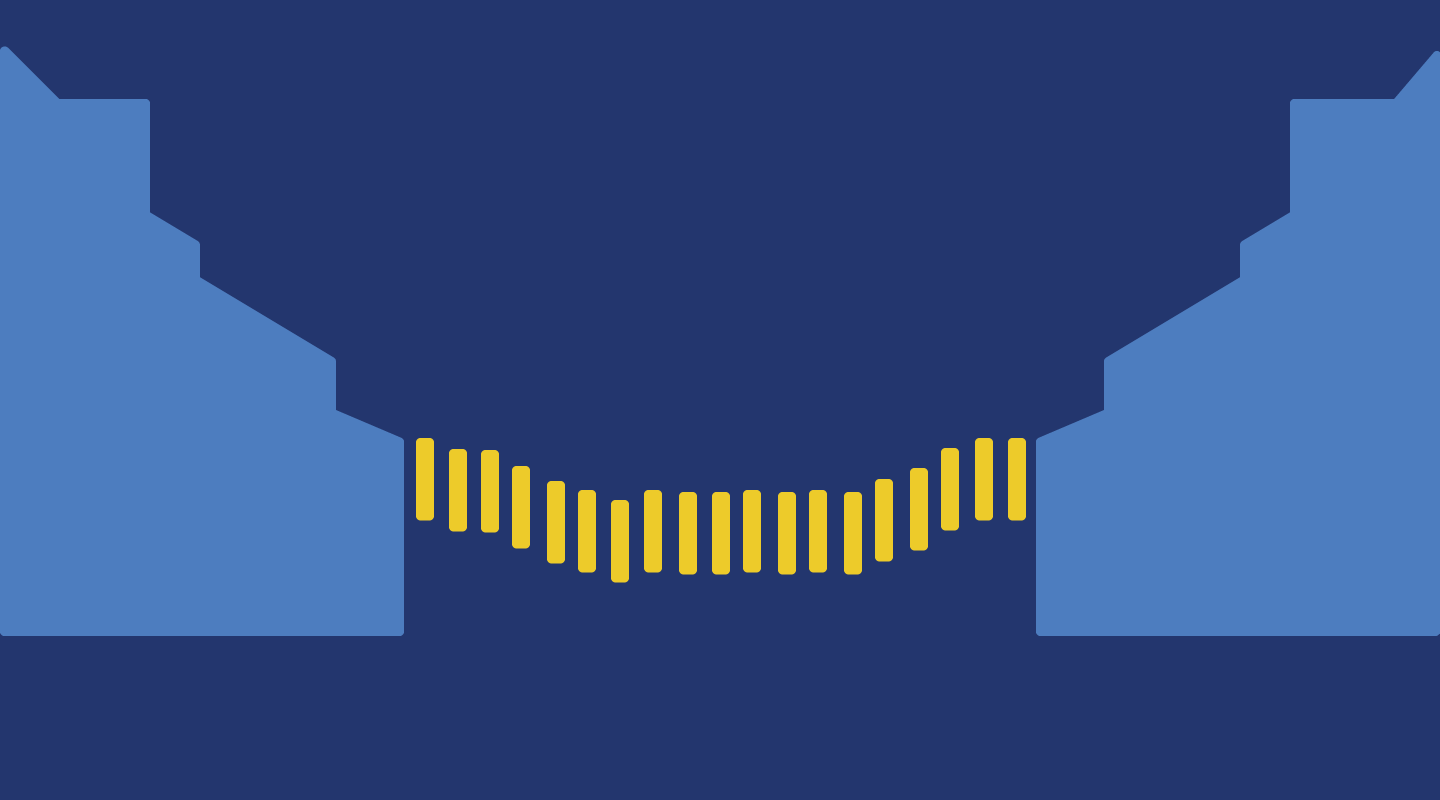
For those without it, closing the digital divide has never been more urgent. Internet access should not be a luxury, and it can no longer be neglected.
As more people shifted their lives online, it was initially unclear if the Internet could withstand the increased demand. The answer was a resounding yes. It allowed people to be more resilient to the social and economic shocks of the pandemic.
The Internet remained reliable while our world became increasingly unpredictable.
The Internet’s resilience is a reflection of the people who developed it and who work to strengthen it and keep it growing.
Chapters, individual and organization members, partners, communities of interest, and staff around the world worked together to meet challenges and overcome obstacles with energy, vision, and determination.
Our annual Impact Report tracks our work by actions and impacts, organized by major shifts in the way people used the Internet compared to years prior. While the projects we highlight in the 2020 report touch on particular successes, they represent only a fraction of our activities.
Surge in Internet Usage
U.S. & EU Broadband Consumption
tbps World-Record Data Consumption
Globally, lockdowns caused Internet use to surge up to 70% by one account Mark Beech, “COVID-19 Pushes Up Internet Use 70% And Streaming More Than 12%, First Figures Reveal” FORBES, 25 MAR 2020, https://www.forbes.com/sites/markbeech/2020/03/25/covid-19-pushes-up-internet-use-70-streaming-more-than-12-first-figures-reveal/?sh=2ef2fbe83104 . In the U.S. and Europe, first quarter average subscriber usage data Broadband Insights Report (OVBI) OPENVAULT, Q1 2020, https://openvault.com/wp-content/uploads/2020/05/Openvault_Q120_DataUsage_FINAL.pdf revealed that broadband consumption increased 47%, from 273.5 GB in 2019 to 402.5 GB in 2020. The Deutsche Commercial Internet Exchange (DE-CIX) in Frankfurt even set a new world record DE-CIX sets a new world record: More than 9 Terabits per second data throughput at Frankfurt Internet Exchange DE-CIX website, 11 MAR 2020, https://www.de-cix.net/en/about-de-cix/media-center/press-releases/de-cix-sets-a-new-world-record for data consumption in March, hitting more than 9.1 Terabits per second.
With Internet resilience thrust into the spotlight like never before, these usage spikes pushed providers to enhance their networks in order to minimize connection and speed hiccups. With the African Union Commission (AUC) and African Telecommunications Union (ATU), the Internet Society organized a series of seven seminars on African Internet resilience https://www.internetsociety.org/events/african-internet-resilience/ to keep networks up and strong. Participants explored solutions ranging from shared spectrum strategies https://www.internetsociety.org/events/african-internet-resilience/shared-spectrum-strategies-to-increase-affordable-access-in-rural-areas/ to complementary access models https://www.internetsociety.org/events/african-internet-resilience/what-about-complimentary-access-models/ to fiberoptic backbone infrastructure https://www.internetsociety.org/events/african-internet-resilience/the-role-of-fibre-optic-backbone-infrastructure-in-affordable-access/ .
HOW DID INTERNET FARE?
A record number of people were online in 2020.

While Internet usage was up, the number of routing incidents reported worldwide dropped – from more than 5,000 in 2017 to fewer than 4,000 at the end of 2020 .
Participant Growth
Network Operators Trained

PARTICIPATION IN MUTUALLY AGREED NORMS FOR ROUTING SECURITY (MANRS) GREW OVER THE YEAR, DOUBLING ITS REACH FROM 317 TO 588 PARTICIPANTS FROM OVER 60 COUNTRIES.
MANRS launched Ambassador https://www.manrs.org/ambassadors-program/ and Fellowship https://www.manrs.org/ambassadors-program/fellows/ programs, bringing together 17 seasoned practitioners. They jointly organized 58 workshops and engaged over 1,400 network operators around the world. Seventy-five Internet Society chapters took part in a global training workshop in March, after which the UbuntuNet Alliance partnered with Internet Society to subsequently train 18 network engineers “NREN engineers hail MANRS training workshop”, UBUNTUNET ALLIANCE, 1 SEP 2020, https://ubuntunet.net/2020/09/nren-engineers-hail-manrs-training-workshop/ from national research and education networks (NRENs) in eight African countries in July.
In addition, Akamai, Amazon Web Services, Azion, Cloudflare, Facebook, Google, Microsoft, Netflix, and other Internet leaders are now working together to secure large portions of cloud infrastructure – thanks to the new MANRS program for content delivery networks and cloud providers https://www.internetsociety.org/news/press-releases/2020/leading-cdn-and-cloud-providers-join-manrs-to-improve-routing-security/ .
Internet exchange points (IXPs) keep traffic local and improve network resiliency.
We supported IXPs with technical expertise, training, and equipment in 26 countries, including 12 in Africa, 3 in Asia-Pacific, 2 in Europe, 8 in Latin America and the Caribbean, and 1 in North America.
We trained more than 600 individuals and organized 20 virtual meetings with peering, network operator, and NREN communities with our partners. We also teamed up with the Asia Pacific Internet Exchange Association (APIX) to study the impact of COVID-19 on IXP operations in 12 countries across the region https://www.internetsociety.org/blog/2020/07/ixps-keeping-local-infrastructure-resilient-during-covid-19/ .
Countries Supported
Individuals Trained
Virtual Community Meetings
Countries Studied for Impact of COVID-19 on IXP Operations
IMPACT SPOTLIGHT
New IXP gains momentum in Guatemala

“The IXP.GT is the best thing that happened to us in 2020! Since we connected in August, we’ve doubled [or tripled] the average bandwidth,” says Ariel Tello, engineer and Project Manager at Señal Nacional, Guatemala’s third-largest residential Internet service-provider (ISP) and one of 10 organizations connected to IXP.GT.
He says connecting to IXP.GT has reduced their payments to international suppliers by at least 15%, allowing them to lower prices and improve capacity. In July, a 1 Mbps monthly download plan ran 149 quetzales (US$19). Now, customers pay that price for triple the download (3 Mbps). If costs fall further, Tello says they’ll be able to invest in expanding to more places without Internet access.
A Facebook node is now being installed – the first Point of Presence in Central America – and connections are being negotiated with other content delivery networks, with help from the Internet Society and the Latin American and Caribbean Internet Exchange Association.
“Before the IXP, it took 30 to 40 milliseconds to receive content, but it takes 2 milliseconds or less now,” explains Marco Antonio To, engineer, professor and IXP.GT President. IXP.GT also enhances security by keeping sensitive data within the country.
IXP.GT also makes participants less vulnerable to natural disasters, says To. Severe hurricane-related flooding in December damaged several international fiber-optic cables, causing delays for non-IXP operators.

Marco Antonio To (IXP.GT President) – Julio Ramírez (Intertelco) – Iván Morales (IXP.GT Technical Director) – Ervin Jiménez (Comnet)
Organizations Connected
Times Average Bandwidth
Decrease in Payments to International Suppliers
Decrease in Speed to Receive Content
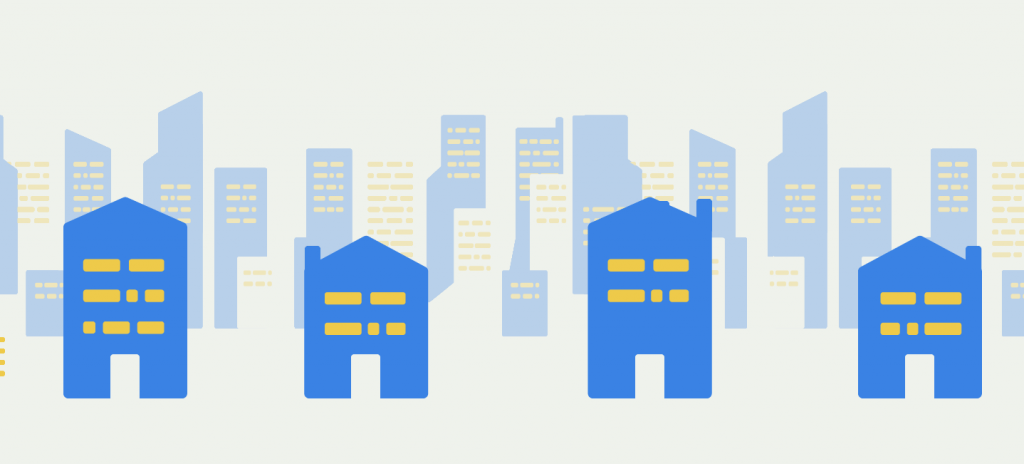
Business not as usual
With numerous stores, banks, and government offices closed during the pandemic, many people shifted to paying bills, collecting benefits, and shopping online. As a result, the first half of 2020 saw an increase in e-commerce equivalent to that of the previous 10 years “The next normal arrives: Trends that will define 2021—and beyond”, MCKINSEY & COMPANY, 4 JAN 2021, ACCESSED 3 FEB 2021, https://www.mckinsey.com/featured-insights/leadership/the-next-normal-arrives-trends-that-will-define-2021-and-beyond . An UNCTAD survey of nine countries “COVID-19 has changed online shopping forever, survey shows “, UNCTAD, 8 OCT 2020, https://unctad.org/news/covid-19-has-changed-online-shopping-forever-survey-shows found more than half of respondents now shop online more frequently, and a survey in Brazil “Painel TIC COVID-19, 1ª Edição”, CETIC.BR, ACCESSED 3 FEB 2021, https://cetic.br/pt/tics/tic-covid-19/painel-covid-19/1-edicao/C6W/ revealed that 54% of people were paying bills or taxes online and 71% were banking or doing financial transfers online.
As the months dragged on, the Great Work-from-Home Experiment became reality. With many workplaces closed, half of the workforce or more was working from home – one global survey found that 45% of respondents worked from home in 2020, while another found that 47% of businesses would allow their employees to work remotely full-time, moving forward, and 82% would allow it at least some of the time. With so many people working and transacting online, the need for online privacy and security has become even more critical.
Spain was among the first countries to be devastated by COVID-19. Amid lockdowns, people suddenly had to adapt to working, buying groceries and paying bills online. For many seniors and small businesses in particular, the learning curve was steep. To help them navigate the transition, 67-year-old retired IT veteran Paulino Moreno, delivers workshops and seminars for Cibervoluntarios (Cyber-volunteers), a Spanish non-profit and Internet Society organization member that provides international technology training and awareness-raising. Moreno was among the 85 participants in an encryption webinar https://youtu.be/nADsFZl1bMY delivered jointly by Internet Society and Cibervoluntarios in May 2020, their first joint activity since partnering in 2019. “The way they explained how to transmit data and documents safely has been useful to me, especially the six-point recommendations from the Internet Society https://www.internetsociety.org/encryption/protect-encryption-protect-yourself/ on how to keep your communications safe,” explains Moreno. He has since incorporated these tips into at least six of his own talks and workshops for audiences ranging from seniors to young entrepreneurs.

Cibervoluntarios, an Internet Society organization member, has also joined the Global Encryption Coalition ( GEC https://www.globalencryption.org/ ) which was launched in May in an effort to challenge laws and proposals that could weaken encryption. Led by a Steering Committee composed of the Internet Society, the Center for Democracy and Technology, and Global Partners Digital, the GEC has grown from 30 members to a diverse array of more than 100 like-minded organizations. The GEC has already made gains in promoting and defending encryption. In November, a group of 50 expert members of the Coalition issued a technical report analyzing and debunking a leaked European Commission document, which analyzed different ways to spot illegal content in encrypted private communications. The Coalition also engaged in lobbying and issued a joint statement https://www.globalencryption.org/2020/10/cdt-gpd-and-internet-society-reject-time-worn-argument-for-encryption-backdoors/ after the “Five-Eyes” intelligence alliance, plus India and Japan, called on companies to create backdoor access for law enforcement to their encrypted devices and services.
While governments and law enforcement agencies continued to call for backdoor access to encrypted communications, we issued policy recommendations https://www.internetsociety.org/covid19-policy-recommendations/ urging lawmakers and network operators to protect the trustworthiness of the Internet .
The recommendations called for policies and regulations to support the use of end-to- end encryption. Our encryption work intensified in 2020 with global advocacy, regional messaging consultations, and global encryption training https://www.internetsociety.org/blog/2020/09/chapter-leaders-worldwide-make-the-case-for-strong-encryption/ for 139 participants from 66 chapters. Training participants went on to engage in advocacy or organize their own local sessions, including in Ghana and Nicaragua.
Internet Society chapters also responded with tenacity and innovation to the turmoil of 2020, creating initiatives to help see their communities through times of crisis and recovery.

One of the three winning Chapterthon projects in 2020 Chapterthon is an opportunity for Internet Society chapters to engage with their members to create projects around a central theme. https://www.internetsociety.org/grants/chapterthon/2020/ https://www.internetsociety.org/grants/chapterthon/2020/projects/ focused on making sure people could use the Internet productively and securely. The Haiti Chapter developed the Smart Mom 2020 program https://www.youtube.com/watch?v=_zE5E7awrhA , training 20 mothers to use online banking or mobile money accounts.
The Bangladesh Chapter hosted a workshop for journalists working from home https://youtu.be/TQoa5fzfoEc at a time when most were using personal devices to publish news, leaving them prone to cyber attacks and disinformation. And the Saint Vincent and the Grenadines Chapter produced a tutorial on automating small businesses’ booking services https://youtu.be/c96Q18riufI , with tips to help small businesses enhance their efficiency by using free digital tools.
The Internet Society hosted a series of virtual trainings which over 70 chapter representatives attended to learn how to improve the overall security and availability of their websites and web servers. As a result of the training, many chapters significantly increased their websites’ compliance with open, secure standards. “After the training session, our chapter made several changes,” says Kolkata India Chapter participant Rittika Ratawa. Indeed, the Kolkata Chapter took its website from 32% compliance to an impressive 100% https://www.internetsociety.org/blog/2020/07/open-standards-everywhere-how-the-kolkata-chapter-got-a-perfect-score/ .
Strengthening the Internet so it remains a force for good.
Students and journalists secure their online communications after encryption training.

Loretta Odame, a 28-year-old student at the Ghana Institute of Journalism, previously used social media without much thought about security or privacy. But after taking an Internet Society-sponsored workshop on encryption, organized by one of her professors, she has since made “a complete change” in the information she shares online and how she uses social media.
“The program helped us see the reasons why encryption matters, because it protects our privacy. That has given us an awareness that there are certain things that we used to do and are not doing anymore. And we are aware of the need to secure our data.”
The workshop content largely replicated the Internet Society’s encryption training course, which was delivered to more than 90 chapter representatives around the world in May. One of the participants in that training was 26-year-old Theorose Elikplim Dzineku, Chair of Programs and Communications for Internet Society Ghana.
Dzineku, who regularly teaches a second-year new media class to 120 students at the Ghana Institute of Journalism, went on to write a research paper examining how Ghanaian journalists understand encryption and apply it to their work. The topic was timely as the pandemic had forced many to use online means of communicating with sources,
and misinformation was rife. She was surprised to learn that most working journalists had no knowledge of encryption.
She put together a proposal and won a $3,000 small grant from the Internet Society Foundation to implement an encryption workshop at the Ministry of Communications.
“I really wanted to use the knowledge that I gained to make a change. I didn’t just want to be part of the numbers who do a training and just go home with a certificate without doing anything,” she says.
Vincent Amedzake is a 24-year-old freelance journalist who attended one of Dzineku’s encryption workshops.
“Before the workshop, we exchanged messages and information using mediums that we didn’t know weren’t secure,” he says, adding that he now relies on basic encryption techniques he learned in the workshop. He’s also changed the way he uses social media and now uses password-secured public WiFi connections.
“One very valid and important thing we learned was that protection is key – encryption is key,” he says.
Education in a pandemic
Amid the global wave of pandemic lockdowns, there was an unprecedented rise in e-learning. As of 1 April, nearly 1.5 billion children in 173 countries “Global monitoring of school closures caused by Coronavirus (Covid-19),” UNESCO [see interactive map data for 1 April 2020], ACCESSED 2 APR 2021, https://en.unesco.org/covid19/educationresponse were affected by school closures. In China, the largest “online movement” in the history of education Cathy Li and Farah Lalani, “The COVID-19 pandemic has changed education forever. This is how,” WORLD ECONOMIC FORUM, 29 APR 2020, https://www.weforum.org/agenda/2020/04/coronavirus-education-global-covid19-online-digital-learning/ occurred in mid-February after the government instructed a quarter of a billion full-time students to resume their studies online.
Having students of all ages studying, submitting homework, and videoconferencing with teachers and classmates online has heightened awareness of the need for safe communications.
The pandemic ushered in a pressing need to improve the digital literacy of children, teachers, and parents. To address these needs, we hosted a Kids, the Internet, and COVID-19 https://www.internetsociety.org/events/kids-the-internet-covid-19-how-to-keep-our-children-safe-online/ webinar to show parents how they can protect their children’s privacy and security online via encryption. The video of the webinar was viewed nearly 3 million times , setting a record for the Internet Society as the most viewed video content.
Further, the original webinar content was replicated by members of the community, including our Japan Chapter which translated the English version into Japanese.
Internet Society chapters devised a number of education-focused projects to keep kids learning and teachers educating online – and to ensure this happened safely and effectively. The Chapter in the Democratic Republic of Congo prepared a video guide to help teachers use Zoom https://youtu.be/fwCv1Om9PYI . The Sri Lanka Chapter developed a blueprint for a catalogue of online educational resources to help school teachers use online tools https://youtu.be/3ohnlal4mtI and catch up on missing lessons. In Trinidad and Tobago, the Chapter developed a crowdsourcing project to build a repository of shared teaching resources https://youtu.be/fUtRIkMkX9E , help teachers access online training, and find other experts. And to empower educators to safely navigate online teaching amid the pandemic, the Uganda Chapter delivered a training on digital safety for 50 educators from 38 schools https://youtu.be/nztoCfYQ9w8 .
Since most schools weren’t closed for the entire year, ensuring connectivity was also a continued priority. To help, the Armenia Chapter provided computers, WiFi connections, and training for rural art schools and libraries https://youtu.be/gDd8qsd3-ps , while the Gambia Chapter refurbished and networked computer labs and donated computers to three schools “Internet Society Gambia Chapter- ISOC Gambia Chapterthon 2020 project, in Partnership with MCJSupport Org”, MCJSUPPORT ORGANIZATION, https://mcjsupport.org/2021/02/16/internet-society-gambia-chapter-isoc-gambia-chapterthon-2020-project-in-partnership-with-mcjsupport-org/ for children with disabilities.
Helping students continue their education amid twin crises in Yemen
More than 150 elementary and high-school students at five different public schools in war-ravaged and pandemic-ridden Yemen now know how to use the Internet safely and effectively to learn.
This was the result of Chapterthon-winning training sessions organized by the Yemen Chapter: Reinforcing digital awareness in Yemeni schools https://youtu.be/yTvQJwAS2-Q . The lessons focused on digital security, privacy, online search techniques, and free e-learning tools such as Zoom and Google Classroom.
When one in five schools in Yemen can no longer be used as a direct result of conflict “As school year starts in Yemen, 2 million children are out of school and another 3.7 million are at risk of dropping out”, UNICEF, SEP 2019, https://www.unicef.org/press-releases/school-year-starts-yemen-2-million-children-are-out-school-and-another-37-million , the Internet is enabling students to continue their education remotely when they can’t physically attend school.
The training sessions have also faced obstacles. They’ve had to be planned around ceasefires or rescheduled due to the eruption of violence. Another challenge was convincing school principals and directors that e-learning training was needed.
“Lots of people have Internet access through mobile phones, tablets, and laptops. There is a big gap in knowledge between parents and their children, as well as teachers,” says Internet Society Yemen Chapter President Sharaf Azzain. “When we realized that the teachers were interested and needed training as well, we included them.”
After the first Chapterthon project, undertaken in the capital of Sanaa, Azzain says the project team went on to organize a similar project in the opposition-recognized capital of Aden. There, four trainers reached more than 120 students and 20 teachers at four schools, providing training on computer literacy and safe Internet use.
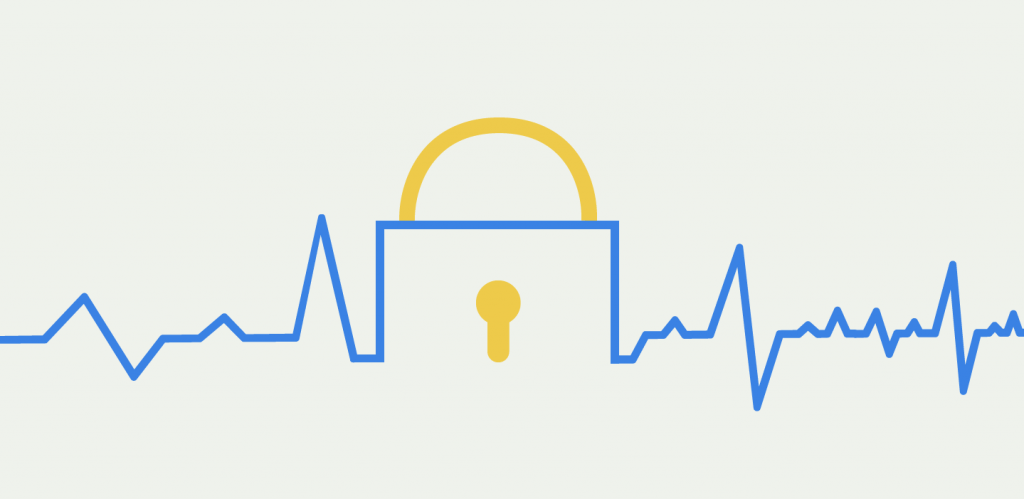
Keeping healthcare secure
Increase of “Ping An Good Doctor” app users in China
Increase of demand for telehealth services in US
At a time when COVID-19 information was crucial, there was substantial growth in telemedicine. Additionally, doctors’ inability to see patients face-to-face catapulted online video consults to record-setting figures. The number of new users on a Chinese healthcare app rose nearly 900% in January 2020 compared to December 2019 Vikram Kapur and Alex Boulton, “Covid-19 Accelerates the Adoption of Telemedicine in Asia-Pacific Countries,” BAIN & COMPANY. APR 2020, https://www.bain.com/insights/covid-19-accelerates-the-adoption-of-telemedicine-in-asia-pacific-countries/ , and visits to a Singaporean telemedicine platform rose more than 160% from the beginning of 2020. A May report showed demand for telehealth services would grow 64.3% in the US in 2020 alone Mike Miliard, “Telehealth set for ‘tsunami of growth,’ says Frost & Sullivan,” HEALTHCARE IT NEWS, MAY 2020, https://www.healthcareitnews.com/news/telehealth-set-tsunami-growth-says-frost-sullivan – and a staggering seven-fold increase was predicted by 2025. Meanwhile, COVID-19 contact-tracing, testing, vaccine development, and vaccination scheduling were all made easier thanks to the Internet.
But people need to know how to use and benefit from these new health apps and services. And with so many people using telehealth, confidential health records must stay private and secure.
The Internet Society, the Center for Democracy and Technology, and Global Partners Digital hosted a webinar series with leading security and technology experts that explored topics like Health, Encryption, and COVID-19: Keeping people and countries safer online https://www.internetsociety.org/events/health-encryption-covid-19/ . Another focused on Health, the Internet and COVID-19: Government backdoor access proposals that threaten Canadian health and security online https://livestream.com/accounts/686369/events/9128375/videos/206047873/player?width=640&height=360&enableInfo=false&defaultDrawer=&autoPlay=false&mute=false .
In addition, the Internet Society’s webinar in the African Internet resilience series explored digital health services and solutions for the medical industry during the pandemic https://www.internetsociety.org/events/african-internet-resilience/digital-solution-for-health-services-and-the-medical-industry-during-the-covid-19-pandemic/ .
Chapters championed health-related projects. In Guinea, they provided community healthcare centers with an Internet connection, an interactive web platform, and messaging services to facilitate interactions between patients and health entities https://youtu.be/3fdzMsKJauY . In Somalia, efforts focused on educating and informing the community about privacy, online security, and getting reliable health information https://youtu.be/ajtsrev02T8 . Meanwhile, the Togo Chapter’s DokitaEyes community digital school project https://youtu.be/N84eTrNJnoM trained community health workers on digital tools to help implement the “Health of Mothers and Children of Togo” project.
How a remote rural town prepared for a pandemic and improved its connectivity
Imagine facing COVID-19 without the Internet. That could have been the reality in El Cuy, a remote town in southern Argentina, had the Internet Society not helped deploy its community network in 2019. Its impact was magnified in 2020.
Maria Goicochea, Director of the El Cuy Hospital, says being connected has allowed doctors to do online consults with specialists, get statistical reports, send urgent patient or administrative records, and find suppliers. They can also access training and Ministry of Health teleconferences. She says without the Internet, COVID-19’s impact would have been unthinkable. “We would have been disarmed, stressed, and helpless!”
Nearly half of El Cuy’s population is over the age of 60 – a high-risk group. People used to have to travel 130 km to a nearby city to get medical prescriptions approved. This is now done online, eliminating long, risky, and costly travel.
The network initially used a 10 Mbps connection borrowed from an Internet Exchange Point (IXP) 200 km away, and the increased traffic amid lockdowns made the connection slow and patchy. In May, the Internet Society published a blog by Nelso Rodríguez, a nurse at the hospital and one of the network’s founders, where he called for more capacity, and placed an article about El Cuy’s network “Cuando una conexión a Internet es el único lazo al mundo en cuarentena: el caso de El Cuy, en Río Negro “, LA NACION, MAY 2020, https://www.lanacion.com.ar/tecnologia/cuando-conexion-internet-es-unico-lazo-al-nid2363234/ in an important Argentine newspaper – La Nación . Soon after, a local Internet service provider upped El Cuy’s backhaul through the IXP by 50% and expanded the number of connections.
For Rodríguez, empowerment has been the greatest impact. “We realized that we could accomplish things and organize our community around a common good,” he said.

Mobilizing—at a safe distance
Being able to raise our voices is a human right and a cornerstone of democracy. But at a time of restricted movement, typical ways of organizing and mobilizing for change have had to adjust.
STAYING HOME HASN’T MEANT STAYING SILENT.
The boom in Internet-based advocacy was accelerated in 2020. U.S. citizens used digital advocacy to engage with all levels of government, undertaking eight times more digital actions in the first half of 2020 than in the last presidential election year in 2016 “State of Advocacy 2020: The year of Digital Advocacy,” PHONE2ACTION, ACCESSED 24 FEB 2021, https://phone2action.com/state-of-advocacy-2020/ . In a Gallup poll Abby Kiesa, “Lack of Voting Information Could Hamper Youth Turnout,” GALLUP 14 JUL 2020, https://news.gallup.com/poll/315761/lack-voting-information-hamper-youth-turnout.aspx , 79% of young people said “the coronavirus pandemic has helped them realize how much political leaders’ decisions impact their lives.” And with the #BlackLivesMatter movement gaining broad public support Nate Cohn and Kevin Quealy, “How Public Opinion Has Moved on Black Lives Matter”, NEW YORK TIMES, 10 JUNE 2020, https://www.nytimes.com/interactive/2020/06/10/upshot/black-lives-matter-attitudes.html globally, a Pew Research survey Brooke Auxier, “Americans’ activism on social media differs by race, age, party,” PEW RESEARCH CENTER, 13 JUL 2020, https://www.pewresearch.org/fact-tank/2020/07/13/activism-on-social-media-varies-by-race-and-ethnicity-age-political-party/ in the U.S. in June found that 54% of social media users aged 18-29 reported using social media to look for information about rallies or protests in their area.
times more digital action than in last U.S. presidential election
of young people realized impact of political leaders’ decisions
of young adult social media users use social platforms to find local rally/protest information
With activities moving online amid the pandemic, the Internet has become more crucial to awareness-raising and advocacy – and advocates’ data and communications must be kept safe and private.
This is even more urgent for marginalized communities and professional advocates, such as journalists, who need to be safe online in order to exercise their rights, engage in advocacy, and hold governments and institutions accountable . We produced factsheets on encryption for LGBTQ+ communities https://www.internetsociety.org/resources/doc/2019/encryption-factsheet-essential-for-lgbtq-community/ and how encryption can protect journalists and the free press https://www.internetsociety.org/resources/doc/2020/fact-sheet-how-encryption-can-protect-journalists-and-the-free-press/ so that more people can securely tell their impactful stories.
In 2020, the Internet Society launched two critical resources to support policy and advocacy.
Internet Society Pulse https://pulse.internetsociety.org/ , launched in December 2020, provides deeper, data-driven insights into the Internet. The platform includes data about the health, availability, and evolution of the Internet, including Internet shutdowns and the deployment of key technologies that enable the Internet’s scalability and security. Policymakers, researchers, journalists, network operators, and civil society groups can gain insights and context to better inform stories, research, and policies – and advocate for undisrupted Internet access.
As the first organization to officially call for an Impact Assessment and work to integrate it into regulatory processes, the Internet Society developed the Internet Impact Assessment Toolkit https://www.internetsociety.org/issues/internet-way-of-networking/internet-impact-assessment-toolkit/ (IIAT). The IIAT assesses the potential effects of emerging policy and technical proposals on critical properties of the Internet . Over time, the IIAT will strengthen accountability in the regulatory process by enabling policymakers and technologists to make more informed, conscious decisions about how to keep the Internet healthy.
Growing the Internet so everyone can benefit from it
A Harlem community news streaming project empowers advocacy, while serving as a virtual lifeline amid the pandemic.
Across the United States, communities were shaken by the homicide of George Floyd “George Floyd death: Violence erupts on sixth day of protests “, BBC NEWS, 1 JUN 2020, https://www.bbc.com/news/world-us-canada-52872401 by a police officer in Minneapolis, Minnesota, in May. A smartphone recording of the event went viral, triggering worldwide protests “How George Floyd Was Killed in Police Custody “, THE NEW YORK TIMES, 31 MAY 2020, https://www.nytimes.com/2020/05/31/us/george-floyd-investigation.html against racism and police brutality and reigniting the Black Lives Matter movement.
In the past, the Black community’s lack of access to media made advocacy difficult. It’s one of the reasons the Internet Society’s New York Chapter applied for an Internet Society Foundation grant https://www.isocfoundation.org/2019/12/internet-society-foundation-announces-300000-in-grants/ for a Streaming Station Community News Project in Harlem. According to Stuart Reid, a community technologist and board member of the New York Chapter, roughly two-thirds of residents are Black and nearly a third are Latino. Half are unemployed and half live below the poverty line. The chapter won a $30,000 grant to help underserved communities produce and stream programs for and about their community.
Pivoting during the pandemic
Weeks into the project, COVID-19 hit, so the project was adapted https://www.isocfoundation.org/story/in-coronavirus-hit-harlem-community-streaming-gives-residents-a-virtual-lifeline/ by shifting from physical studio settings to online applications like Zoom, Facebook Live, YouTube, and various websites, such as www.safensmart.org https://www.safensmart.org/ , to host the community-produced content. News broadcasts, discussions, and motivational shows kept local residents informed about everything from health and safety precautions to local food distribution.
According to Polly Spain, President of the Federal 8 Housing Group, this information has “made a world of difference – it’s been a matter of life and death, really! … We set up access to food, figured out who needed health services…and lawyers, because many people are facing eviction after losing their jobs…. It’s truly been a lifeline.”
The Wisdom Table, co-hosted by Brother Leroy, produced by and for senior citizens, invited a cavalcade of doctors to speak about COVID-19 prevention. Viewers could ask questions of medical providers online.
“Everyone was scared because we’re in the epicenter,” says project manager and Digital Divide Partners co-Chair Doug Frazier.
“Once we got all these doctors on, it helped calm people down. At the time, you couldn’t see a doctor, and you couldn’t go to the emergency room if you didn’t have COVID… so being able to talk to a doctor was worth its weight in gold.”
These shows also debunk misinformation, while dealing with angles not covered by mainstream media, such as how the East Harlem zip code was the hardest-hit by COVID-19 in Manhattan. They’ve also covered the Black Lives Matter movement, with shows like Community & Technology discussing racial equity, policing, corporate sponsorship, and a universal basic income.
“It’s been electricity in terms of the engagement and enthusiasm,” says Brother Leroy, adding that having the community tell its own stories makes the project “a game changer.”
The New York Chapter also engaged in advocacy of its own, issuing a public statement http://lists.isoc-ny.org/pipermail/announce-isoc-ny.org/2020/000795.html in response to the George Floyd killing.

Expanding community networks
Up to one in three Harlem households Household Internet Access , KEEPING TRACK ONLINE, https://data.cccnewyork.org/data/map/1325/household-internet-access#1325/a/3/1547/62/a/a do not have home Internet access – either via computer or mobile phone. Among low-income households, only half are connected.
Under a previous project by Digital Divide Partners https://www.digitaldividepartners.org/ , the Y-Fi Community Network was established, with 500 nodes across New York City. The recent Internet Society Foundation grant helped to expand its coverage by 25 nodes. As a result, more than 75,000 public housing residents can now watch community-produced programming, many of them using the Y-Fi in 10 public housing developments in Harlem and South Bronx.
“We don’t think people should pay a private operator to get Internet access, be safe or to get educated,” says Frazier. “So, we built something so that people could be informed and help and empower themselves. The residents help build the network so you build their skills in the process, and then hopefully get jobs to keep maintaining the network.”
For all the ways the Internet was a lifeline amid the pandemic, the reality is that less than half of the world’s population had access to this lifeline in 2020.
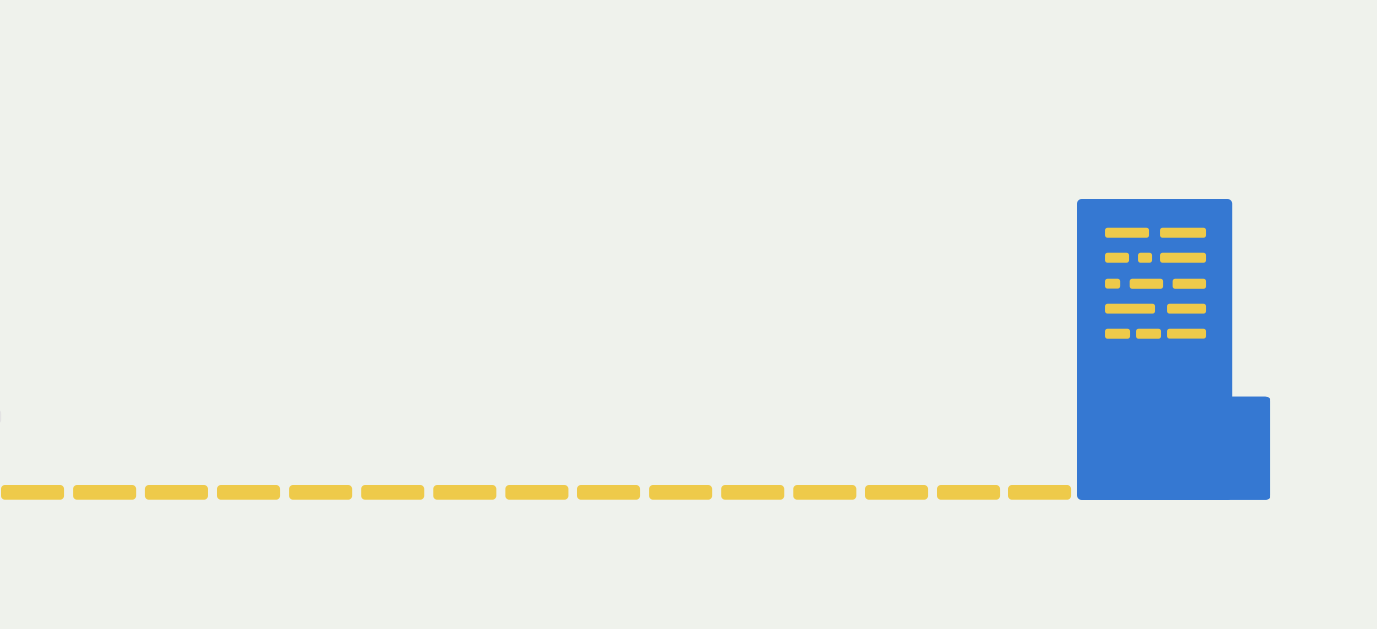
Connecting the unconnected
Completing schoolwork on a cellphone
Unable to do schoolwork because of no at-home computer
Worried about high-speed Internet bill payment
Further, there were gaping inequalities in access between, and within, developed and developing countries. According to a UNICEF-ITU report “Two thirds of the world’s school-age children have no internet access at home, new UNICEF-ITU report says,” UNICEF, 30 NOV 2020, https://www.unicef.org/press-releases/two-thirds-worlds-school-age-children-have-no-internet-access-home-new-unicef-itu , 63% of the world’s school-age children – 1.3 billion children aged 3 to 17 – have no Internet access at home. The gap is greatest in poor and rural households: fewer than 1 in 20 school-age children from low-income countries have Internet at home, compared with nearly 9 in 10 from high-income countries. Even in developed countries, connectivity is low among those with low incomes.
According to a Pew Research Center survey “53% of Americans Say the Internet Has Been Essential During the COVID-19 Outbreak”, PEW RESEARCH CENTER, 30 APR 2020, https://www.pewresearch.org/internet/2020/04/30/53-of-americans-say-the-internet-has-been-essential-during-the-covid-19-outbreak/ in the United States in April, 43% of lower-income parents with children whose schools were shut down said their kids would have to do schoolwork on their cellphones and 36% said their children would be unable to do schoolwork because they lacked access to a computer at home. Among those with Internet, 52% of lower-income broadband users said they worried about being able to pay for their high-speed Internet connection over the coming months.
Internet access is no longer optional.
When education, work, life-saving health information, and even medical attention have all shifted to digital platforms, connecting the unconnected is an urgent matter. The pandemic has laid bare the global failure in making “last mile” connectivity widely accessible and affordable.
To fill such gaps, in 2020, the Internet Society supported at least 25 new and existing community networks (CNs) around the world – in Argentina, Canada, the Galapagos Islands, Ethiopia, Georgia, Ghana, Greece https://www.internetsociety.org/blog/2021/03/sarantaporo-gr-community-network-tending-to-our-communities-needs-with-care-and-flexibility/ , Italy, Mexico, Nigeria, South Africa, Uganda Latanya Tower Construction 2020 video, BOSCO UGANDA, https://youtu.be/D80kWubF2jw , Zimbabwe, and in the United States ( New York City https://www.internetsociety.org/blog/2020/03/in-new-york-city-building-a-network-while-social-distancing/ , Baltimore “Community school, tech groups join forces to set up free Wi-Fi network in Sandtown”, BALTIMORE BUSINESS JOURNAL, 8 MAY 2020 https://www.bizjournals.com/baltimore/news/2020/05/08/community-school-tech-groups-join-forces-to-set-up.html , Seattle, and Hawaii).
The 2020 Chapterthon included several projects focused on providing Internet access to those who were offline, one of which was a community network in Salinas, Bolivia https://youtu.be/9Uo_LU6CxwU . A project in Turkey developed and deployed a blockchain network in four different cities https://youtu.be/ewkJK1SzzKA with a goal to help non-government agencies communicate and manage their resources efficiently when responding to disasters. The South Africa Chapter’s Internet-In-A-Box https://youtu.be/FJljDlPyuDk tutorial and the Panama Chapter’s manual for digital inclusion https://youtu.be/mueX5dGIeOA focused on Internet access through Raspberry Pi devices. The Panama Chapter also trained residents of Parara Puru, a local Indigenous community with no electricity, potable water, or Internet. “More than anything we need computers, electricity and technology, so our children can study,” said Brenio, one of the participants in the training.
We also improved know-how and helped CNs thrive through virtual meetings and expert advice exchange. Furthermore, we expanded the set of countries and intergovernmental organizations that recognize the value and support CNs.
More than 2,000 participants took part in the Community Network Exchange Asia-Pacific meeting, as well as a webinar to share Asian success stories https://www.internetsociety.org/blog/2020/07/how-community-networks-are-helping-during-covid-19/ . As part of the 2020 Indigenous Connectivity Summit https://www.internetsociety.org/events/indigenous-connectivity-summit/2020/ , 80 people completed courses on Community Networks https://www.internetsociety.org/events/indigenous-connectivity-summit/2020/trainings/community-networks-webinar/ and Policy&Advocacy https://www.internetsociety.org/events/indigenous-connectivity-summit/2020/trainings/policy-advocacy-webinar/ and agreed to a set of policy recommendations https://www.internetsociety.org/resources/doc/2020/2020-ics-policy-recommendations/ that could make it easier for Indigenous communities to get connected on their own terms. The Summit on Community Networks in Africa https://www.internetsociety.org/events/summit-community-networks-africa held three sessions in September-November; partner organizations conducted a series of webinars on CNs and access issues; and an interactive panel discussion on Building Community Networks in the Middle East and North Africa took place in December. In Latin America and the Caribbean, 295 people, including policymakers, took our “Building Wireless Community Networks” course, while our high-level webinar “Innovative Models to Connect the Unconnected” attracted 174 representatives from the Inter-American Telecommunications Commission from more than 20 countries.
Finally, we worked with governmental authorities to secure their support to CNs. At the local and regional levels, we partnered with key countries, such as Ethiopia, Uganda, Kenya, and Brazil, towards enabling regulatory environments. At the global level, we secured that the value of CNs was recognized in official outcomes of the ITU-D and the G20.
Bringing Internet access to homes when public access became impossible
Before the pandemic began, most residents of the town of Murambinda, eastern Zimbabwe, accessed the Internet at the local Cybercafé, the main public access point for Africa’s first community network. Others could connect through Murambinda Works hotspots in schools, government offices, and the district health centre.
But as pandemic-related lockdowns, quarantines and restrictions began, many residents realized they could no longer connect from these public places.
This “caused a major outcry from communities who needed to keep in contact with their loved ones,” says Joseph Bishi, who was the technical lead during the Murambinda Works CN expansion and training project https://www.internetsociety.org/blog/2018/12/murambinda-works-community-engagement-workshop/ sponsored by the Internet Society in 2018–2019. That project helped expand the community network along a 40-km radius, connecting four schools, a district referral hospital, some non-governmental organizations, and local government offices.
In 2020, with many residents unable to work and children unable to access e-learning, Bishi decided to approach the Internet Society to connect people from their homes.
He got a $10,000 grant, which enabled a mast with solar-powered systems to be installed in Murambinda from November through December. This has created residential hotspots that allow community residents to access public health education materials offline, through a platform developed in collaboration with TunapandaNET. Residents can access local content for free or the Internet for a fee.
“The support was of a great relief to us as a community ISP … to accommodate a new way of living for rural communities, so that you can work from home, attend church from home, and even [do] schooling,” says Bishi. “The availability of a community network in Murambinda has become the life hub of the community.”
Now, another platform allows students to access educational material through the school management system Murambinda Works developed in 2019. Students and teachers can experience a virtual classroom. Many children and teachers are already equipped for e-learning – a downwind impact of Internet Society’s earlier funding. Prior to the pandemic, at least 1,500 teachers out of 3,224 and over 400 health workers across the province had also been trained by Murambinda Works on basic ICT and computer literacy.
The school management system has also allowed district education inspectors to remotely access schools without the need for travel. Bishi says additional policy changes could be on the way that will benefit all underserved communities across the country.

The Internet was a cornerstone of 2020.
The pandemic created unique, and often surprising, challenges to our work. But we kept up the momentum, even if it meant we had to sometimes adjust our expectations.
The myriad challenges of 2020 have underscored the creativity, expertise, and perseverance of the Internet Society community and staff in the face of adversity. They fueled solutions that helped the world navigate this time of global confusion, anxiety, and insecurity. This drive will help navigate the recovery, in 2021 and beyond.
And while the world understands more than ever how essential and how powerful the Internet can be, it still cannot replace face-to-face interaction. Rather, it plays an important supporting role for human interaction that shines through during crises, and can be a beacon on our path back to normal.
As we work to overcome the barriers of the digital divide by building better and stronger networks, more people will have the means to weather future storms. Connecting the unconnected is especially pressing, to ensure no one is left behind.
Our mission — to ensure an open, globally-connected, secure, and trustworthy Internet for all — is as challenging as ever. But 2020 has helped the world understand its importance, and urgency, more clearly than ever.
We can’t do it alone.
Join our growing global movement of people committed to creating a bigger and stronger Internet for everyone. Become a member. Attend an Internet Society event. Become a partner. Follow us on social media. Above all, learn more and engage in the conversations that will help create an open and trusted Internet for everyone.
- The importance of degree of freedom – Greetinglines
- How to Rewrite Your Essay to Make it Better Than the Original
- Advantages of Digital Marketing For Your Business
- How to Revise and Edit Your Essay Like A Pro
- Best Affordable Memory Foam Mattress By Novilla
Greetinglines
Best Greetings For Loved Ones
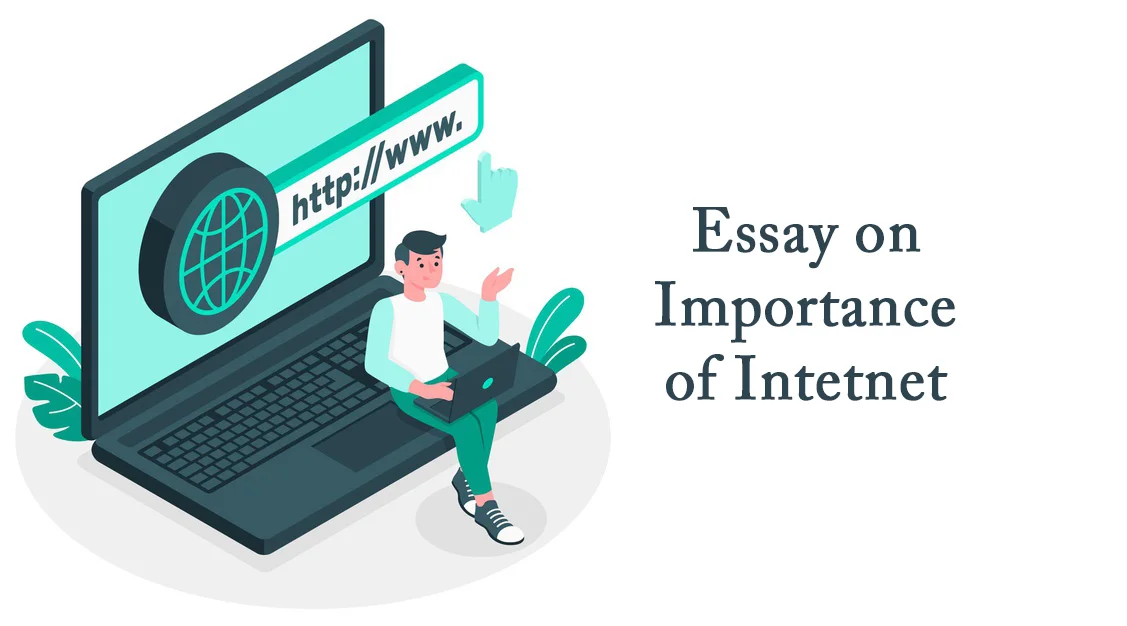
Essay on Importance of Internet in our Daily Life
Here is an Essay on Importance of Internet in our daily life that you can copy!
The 21st century is the age of science and technology. This is not only possible by the efforts of our generation but also our previous generations. One of the results of such advancements in the field of science and technology is the internet .
Internet may be defined as a connected group of computer networks, enabling electronic communication. The Internet is the world’s largest communication and a network connecting millions of computer users. It is of great help for everyone as it has reduced work as well as the stress of people. The importance of the internet in our tech lives is similar to oxygen to us people. Moreover, the Internet is an invention of top-of-the-range science and modern technology. Internet technology has changed the way we talk to each other, do business, or play.
At the present time, the Internet has become a massive part of our daily life, and is challenging to assume the world without the internet. The internet is a large library composed of records, pictures, websites, and pieces of information. Adding on, we can say the Internet has vast importance in the field of communication. Without the internet, the ability to share thoughts and ideas across the globe would have been only a dream. It is due to the internet that such an ability is possible. An example of it could be searching for solutions for a difficult assignment. We enjoy the facility to communicate with people all over the globe. Services like email, messenger, etc are an example of the use of the internet. Without the internet, it would be hard to imagine how large the world would be. It has become very easy to build a kind of global friendship where one can explore other cultures of different countries.
We can find various information about the world through the power of the internet. The internet hosts things like Wikipedia, which is one of the largest best-composed reference books kept up by a vast community of volunteer scholars and editors from all over the world. This is very helpful for students and even people who want answers to their questions. The internet is the perfect place to get answers to your curiosity. In the field of education, it plays a major role, especially taking the Corona pandemic into consideration. The Internet has helped us develop an innovative approach to replace the traditional education system. It offers additional resources for studying, students can take their classes in the comforts of their home and can also browse for classes – lectures with no extra cost freely through the internet. The internet is also a place where you can conduct research and online surveys.
📌 Read – Essay on Importance of English Language
The main attraction of the internet is the entertainment services it offers. Streaming platforms like Netflix, YouTube are very popular among internet users. People can watch entertaining, informative videos through the internet. The presence of the internet is slowly replacing the use of newspapers. People can search for fun videos to watch, text with their friends, Play games, etc. The Internet allows the service of playing games online with friends and other people all over the globe. In fact, global gaming worth has been valued more than the music and video industry together. People can search for fun videos to watch, text with their friends, Play games, etc. The top industry in the world is IT, which includes apps such as messenger, Facebook, and games such as PubG, League of legends, etc are only due to the presence of the internet.
The Internet is a source of information and also commerce. You can promote and promote your item on the internet as well. The internet may be an extraordinary put where businessmen advance their items and administrations and discover modern customers. The Internet is an opportunity for new companies to create their claim commerce with their unique thoughts and ideas. The internet is an opportunity for a business to attract foreign customers as well. Online business is very popular as you can order things online and get it delivered to your own doorstep. The world has become really easy for us to live in. The idea of having digitalized money for online transactions is also popular nowadays; cryptocurrencies (online money). Bitcoin is one of the examples of such cryptocurrency and the worth for just a single bitcoin is over 18,000 dollars.
Through the internet, you can also book your hotels or travel tickets online. You can also search for places up and see how it is. You can experience going to places where you can’t go through the internet. You can see documentaries or videos through the eyes of other people through the internet. The Internet is playing an essential part in human and social advancement. It is without a doubt that the use of the internet is effective in Career, Trade, and in life. There are different employments of the internet in our lives and we are able to do different profitable things as well. Individuals utilize the web agreeing to their interests. The internet is a powerful and profitable tool if used correctly. It brings people together and it is necessary to use such a boon well.
Other Essays
- Essay on Dashain Festival
- Essay on Holi Festival

You May Also Like

Essay on cleanliness for 800+ Words | Paragraph on cleanliness

5 Methods to Enjoy Studying – Greetinglines

Everything You Need to About Speech on Farewell
One thought on “ essay on importance of internet in our daily life ”.
This is an awesome and helpful article for me. I appreciate your work providing such useful information; thank you so much!
Leave a Reply Cancel reply
Your email address will not be published. Required fields are marked *
Save my name, email, and website in this browser for the next time I comment.
24/7 writing help on your phone
To install StudyMoose App tap and then “Add to Home Screen”
The Significance of the Internet in Modern Life
Save to my list
Remove from my list
Educational Advancements Through Internet Accessibility
Professional and business applications.

Entertainment and Productivity Enhancement
The Significance of the Internet in Modern Life. (2016, Nov 30). Retrieved from https://studymoose.com/role-of-internet-in-our-daily-lives-essay
"The Significance of the Internet in Modern Life." StudyMoose , 30 Nov 2016, https://studymoose.com/role-of-internet-in-our-daily-lives-essay
StudyMoose. (2016). The Significance of the Internet in Modern Life . [Online]. Available at: https://studymoose.com/role-of-internet-in-our-daily-lives-essay [Accessed: 1 Sep. 2024]
"The Significance of the Internet in Modern Life." StudyMoose, Nov 30, 2016. Accessed September 1, 2024. https://studymoose.com/role-of-internet-in-our-daily-lives-essay
"The Significance of the Internet in Modern Life," StudyMoose , 30-Nov-2016. [Online]. Available: https://studymoose.com/role-of-internet-in-our-daily-lives-essay. [Accessed: 1-Sep-2024]
StudyMoose. (2016). The Significance of the Internet in Modern Life . [Online]. Available at: https://studymoose.com/role-of-internet-in-our-daily-lives-essay [Accessed: 1-Sep-2024]
- Life Before the Internet and After the Internet Pages: 2 (521 words)
- Internet in the Modern Life Pages: 2 (499 words)
- The Role of Internet in Modern Life Pages: 2 (320 words)
- Great Expectations: a Modern Tragedy in Modern Life Pages: 4 (1042 words)
- The Significance of Motivation in Modern Management Pages: 6 (1767 words)
- The Significance of Reading and Writing Abilities in the Modern World Pages: 2 (358 words)
- Eva Hesse: Her significance in Modern Art Pages: 2 (555 words)
- Guardians of Privacy: Navigating the Significance of HIPAA in Modern Healthcare Pages: 3 (631 words)
- The Significance of Newspapers in the Modern World Pages: 3 (732 words)
- The Significance of Strategic Thinking in Modern Contexts Pages: 3 (845 words)
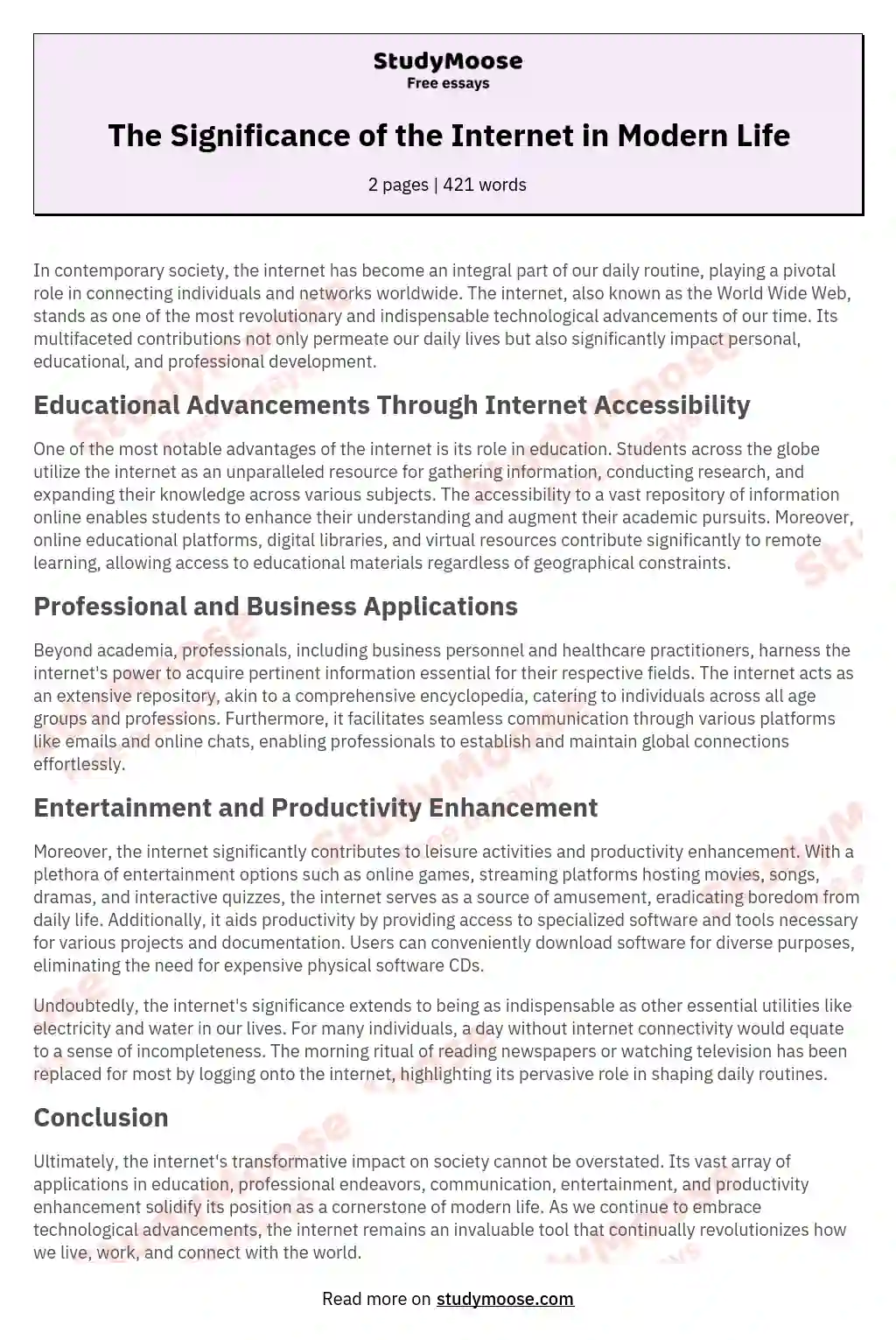
👋 Hi! I’m your smart assistant Amy!
Don’t know where to start? Type your requirements and I’ll connect you to an academic expert within 3 minutes.
Numbers, Facts and Trends Shaping Your World
Read our research on:
Full Topic List
Regions & Countries
- Publications
- Our Methods
- Short Reads
- Tools & Resources
Read Our Research On:
- The Internet and the Pandemic
90% of Americans say the internet has been essential or important to them, many made video calls and 40% used technology in new ways. But while tech was a lifeline for some, others faced struggles
Table of contents.
- 1. How the internet and technology shaped Americans’ personal experiences amid COVID-19
- 2. Parents, their children and school during the pandemic
- 3. Navigating technological challenges
- 4. The role of technology in COVID-19 vaccine registration
- Acknowledgments
- Methodology

Pew Research Center has a long history of studying technology adoption trends and the impact of digital technology on society. This report focuses on American adults’ experiences with and attitudes about their internet and technology use during the COVID-19 outbreak. For this analysis, we surveyed 4,623 U.S. adults from April 12-18, 2021. Everyone who took part is a member of the Center’s American Trends Panel (ATP), an online survey panel that is recruited through national, random sampling of residential addresses. This way nearly all U.S. adults have a chance of selection. The survey is weighted to be representative of the U.S. adult population by gender, race, ethnicity, partisan affiliation, education and other categories. Read more about the ATP’s methodology .
Chapter 1 of this report includes responses to an open-ended question and the overall report includes a number of quotations to help illustrate themes and add nuance to the survey findings. Quotations may have been lightly edited for grammar, spelling and clarity. The first three themes mentioned in each open-ended response, according to a researcher-developed codebook, were coded into categories for analysis.
Here are the questions used for this report , along with responses, and its methodology .
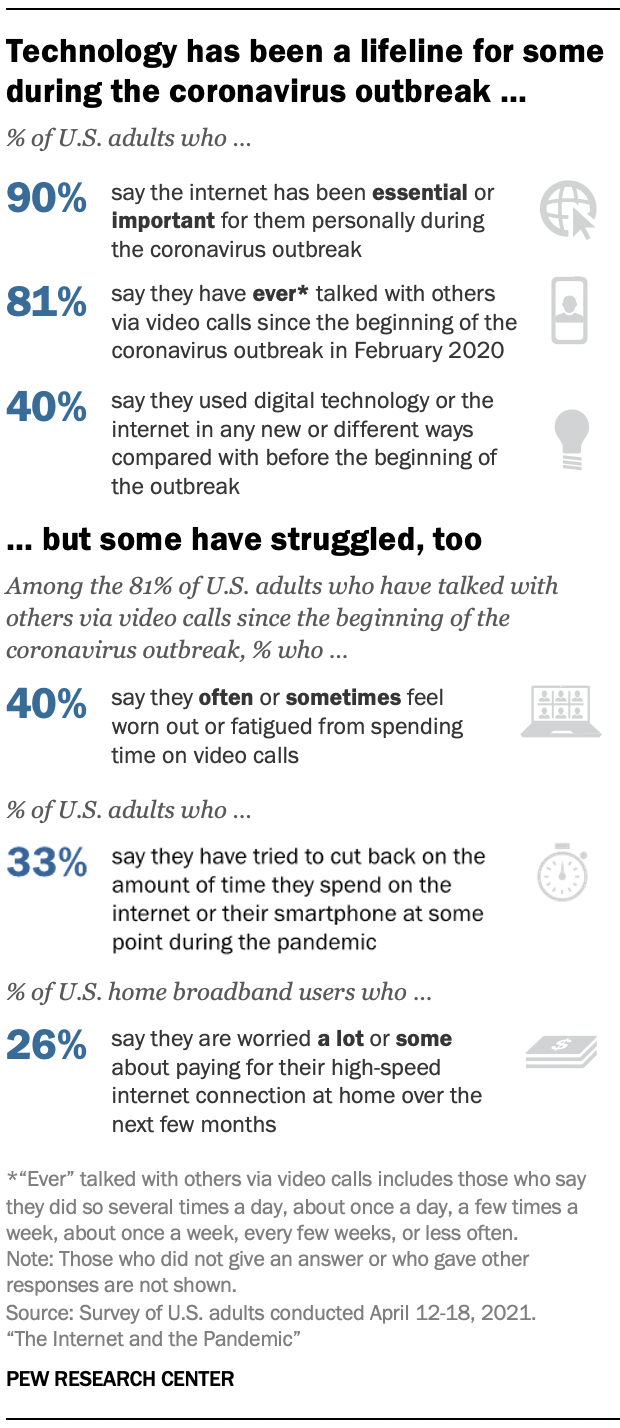
The coronavirus has transformed many aspects of Americans’ lives. It shut down schools, businesses and workplaces and forced millions to stay at home for extended lengths of time. Public health authorities recommended limits on social contact to try to contain the spread of the virus, and these profoundly altered the way many worked, learned, connected with loved ones, carried out basic daily tasks, celebrated and mourned. For some, technology played a role in this transformation.
Results from a new Pew Research Center survey of U.S. adults conducted April 12-18, 2021, reveal the extent to which people’s use of the internet has changed, their views about how helpful technology has been for them and the struggles some have faced.
The vast majority of adults (90%) say the internet has been at least important to them personally during the pandemic, the survey finds. The share who say it has been essential – 58% – is up slightly from 53% in April 2020. There have also been upticks in the shares who say the internet has been essential in the past year among those with a bachelor’s degree or more formal education, adults under 30, and those 65 and older.
A large majority of Americans (81%) also say they talked with others via video calls at some point since the pandemic’s onset. And for 40% of Americans, digital tools have taken on new relevance: They report they used technology or the internet in ways that were new or different to them. Some also sought upgrades to their service as the pandemic unfolded: 29% of broadband users did something to improve the speed, reliability or quality of their high-speed internet connection at home since the beginning of the outbreak.
Still, tech use has not been an unmitigated boon for everyone. “ Zoom fatigue ” was widely speculated to be a problem in the pandemic, and some Americans report related experiences in the new survey: 40% of those who have ever talked with others via video calls since the beginning of the pandemic say they have felt worn out or fatigued often or sometimes by the time they spend on them. Moreover, changes in screen time occurred for Americans generally and for parents of young children . The survey finds that a third of all adults say they tried to cut back on time spent on their smartphone or the internet at some point during the pandemic. In addition, 72% of parents of children in grades K-12 say their kids are spending more time on screens compared with before the outbreak. 1
For many, digital interactions could only do so much as a stand-in for in-person communication. About two-thirds of Americans (68%) say the interactions they would have had in person, but instead had online or over the phone, have generally been useful – but not a replacement for in-person contact. Another 15% say these tools haven’t been of much use in their interactions. Still, 17% report that these digital interactions have been just as good as in-person contact.
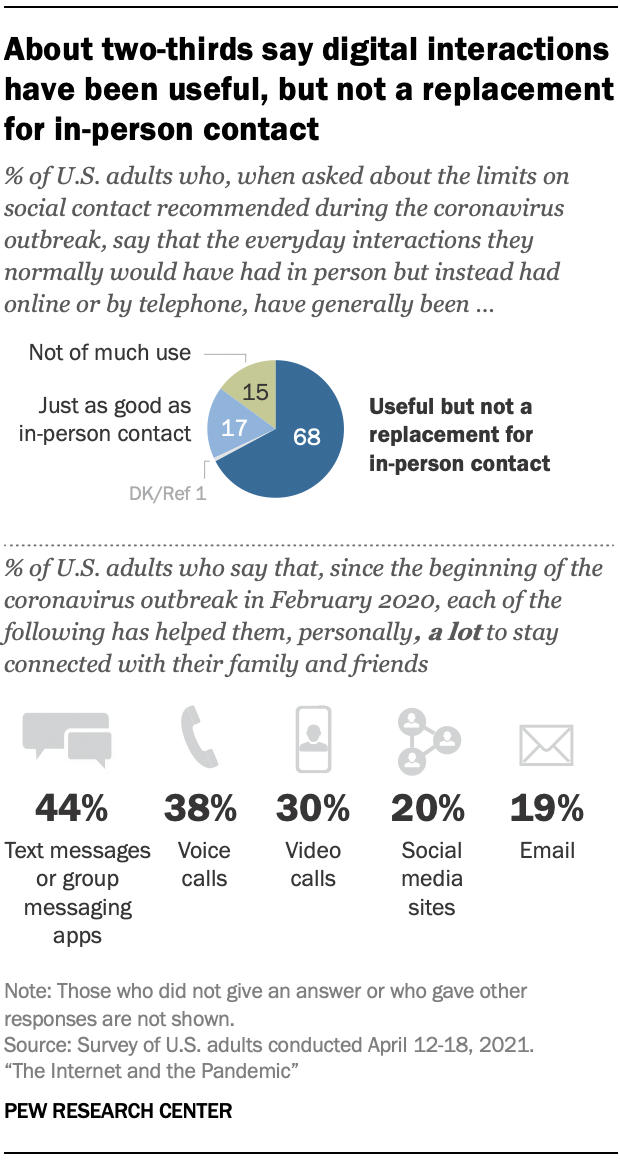
Some types of technology have been more helpful than others for Americans. For example, 44% say text messages or group messaging apps have helped them a lot to stay connected with family and friends, 38% say the same about voice calls and 30% say this about video calls. Smaller shares say social media sites (20%) and email (19%) have helped them in this way.
The survey offers a snapshot of Americans’ lives just over one year into the pandemic as they reflected back on what had happened. It is important to note the findings were gathered in April 2021, just before all U.S. adults became eligible for coronavirus vaccine s. At the time, some states were beginning to loosen restrictions on businesses and social encounters. This survey also was fielded before the delta variant became prominent in the United States, raising concerns about new and evolving variants .
Here are some of the key takeaways from the survey.
Americans’ tech experiences in the pandemic are linked to digital divides, tech readiness
Some Americans’ experiences with technology haven’t been smooth or easy during the pandemic. The digital divides related to internet use and affordability were highlighted by the pandemic and also emerged in new ways as life moved online.
For all Americans relying on screens during the pandemic, connection quality has been important for school assignments, meetings and virtual social encounters alike. The new survey highlights difficulties for some: Roughly half of those who have a high-speed internet connection at home (48%) say they have problems with the speed, reliability or quality of their home connection often or sometimes. 2
Beyond that, affordability remained a persistent concern for a portion of digital tech users as the pandemic continued – about a quarter of home broadband users (26%) and smartphone owners (24%) said in the April 2021 survey that they worried a lot or some about paying their internet and cellphone bills over the next few months.
From parents of children facing the “ homework gap ” to Americans struggling to afford home internet , those with lower incomes have been particularly likely to struggle. At the same time, some of those with higher incomes have been affected as well.
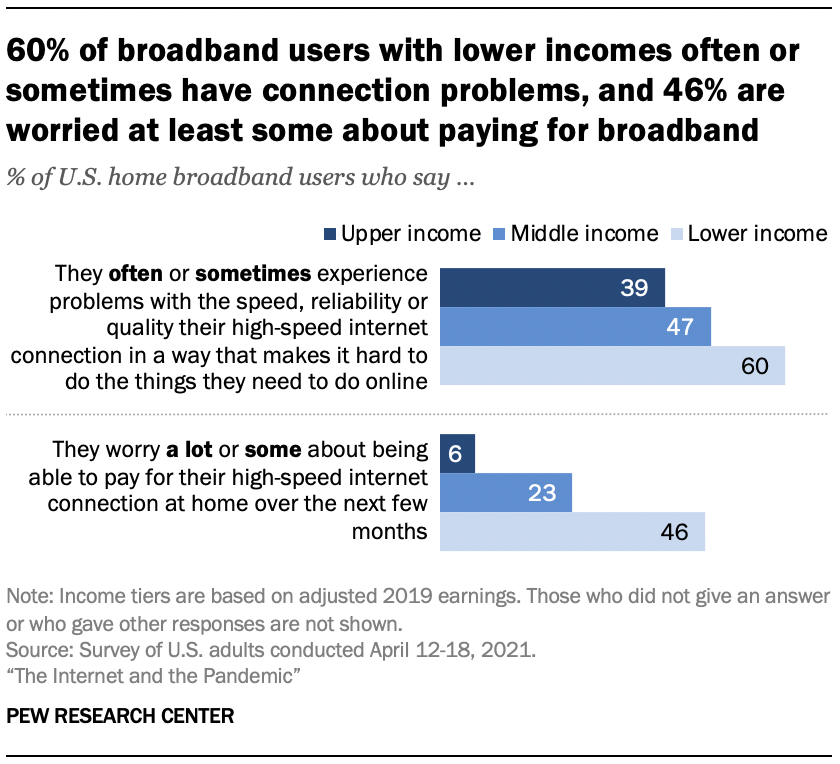
Affordability and connection problems have hit broadband users with lower incomes especially hard. Nearly half of broadband users with lower incomes, and about a quarter of those with midrange incomes, say that as of April they were at least somewhat worried about paying their internet bill over the next few months. 3 And home broadband users with lower incomes are roughly 20 points more likely to say they often or sometimes experience problems with their connection than those with relatively high incomes. Still, 55% of those with lower incomes say the internet has been essential to them personally in the pandemic.
At the same time, Americans’ levels of formal education are associated with their experiences turning to tech during the pandemic.
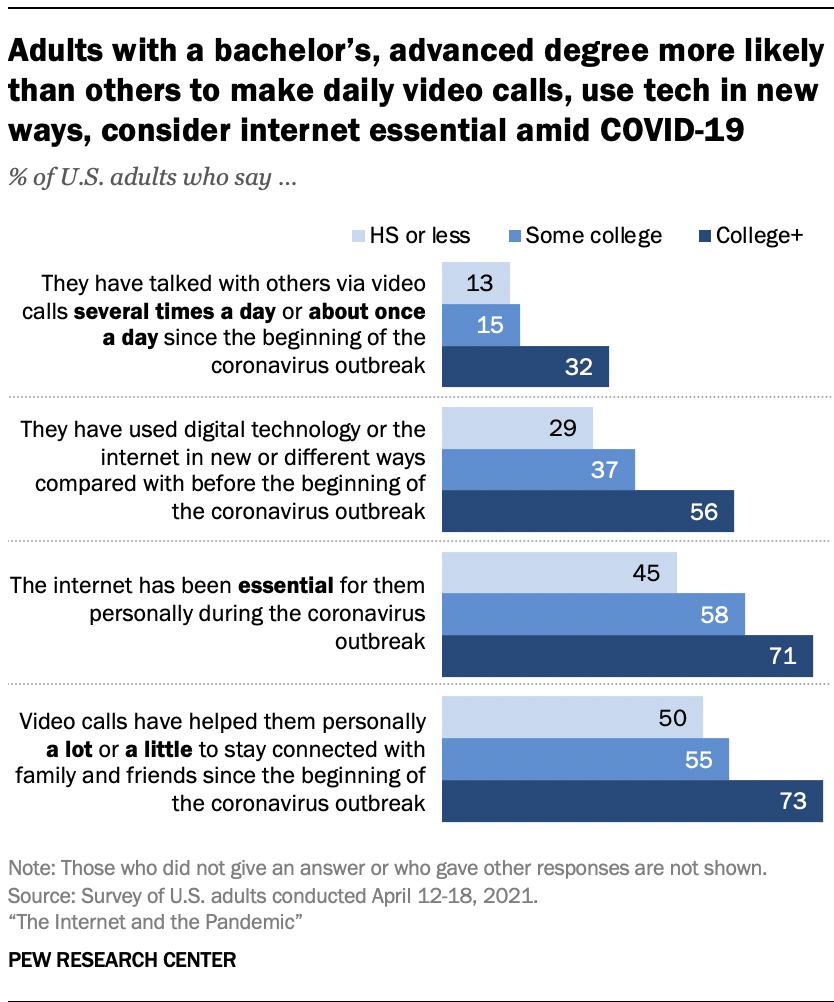
Those with a bachelor’s or advanced degree are about twice as likely as those with a high school diploma or less formal education to have used tech in new or different ways during the pandemic. There is also roughly a 20 percentage point gap between these two groups in the shares who have made video calls about once a day or more often and who say these calls have helped at least a little to stay connected with family and friends. And 71% of those with a bachelor’s degree or more education say the internet has been essential, compared with 45% of those with a high school diploma or less.
More broadly, not all Americans believe they have key tech skills. In this survey, about a quarter of adults (26%) say they usually need someone else’s help to set up or show them how to use a new computer, smartphone or other electronic device. And one-in-ten report they have little to no confidence in their ability to use these types of devices to do the things they need to do online. This report refers to those who say they experience either or both of these issues as having “lower tech readiness.” Some 30% of adults fall in this category. (A full description of how this group was identified can be found in Chapter 3. )
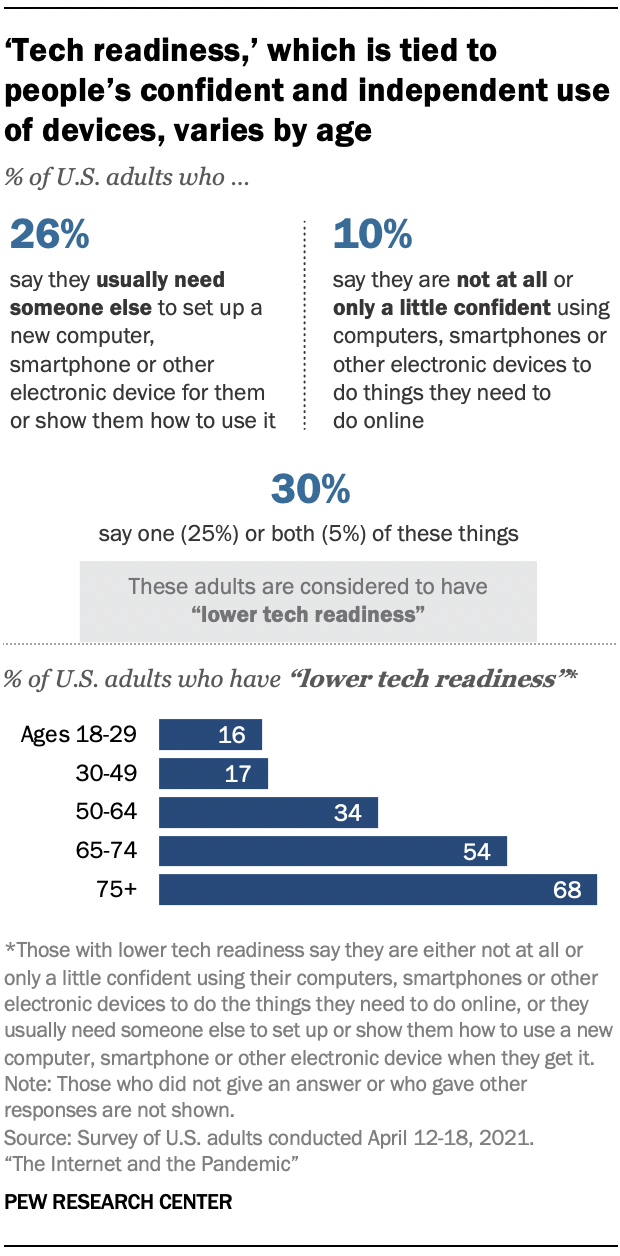
These struggles are particularly acute for older adults, some of whom have had to learn new tech skills over the course of the pandemic. Roughly two-thirds of adults 75 and older fall into the group having lower tech readiness – that is, they either have little or no confidence in their ability to use their devices, or generally need help setting up and learning how to use new devices. Some 54% of Americans ages 65 to 74 are also in this group.
Americans with lower tech readiness have had different experiences with technology during the pandemic. While 82% of the Americans with lower tech readiness say the internet has been at least important to them personally during the pandemic, they are less likely than those with higher tech readiness to say the internet has been essential (39% vs. 66%). Some 21% of those with lower tech readiness say digital interactions haven’t been of much use in standing in for in-person contact, compared with 12% of those with higher tech readiness.
46% of parents with lower incomes whose children faced school closures say their children had at least one problem related to the ‘homework gap’
As school moved online for many families, parents and their children experienced profound changes. Fully 93% of parents with K-12 children at home say these children had some online instruction during the pandemic. Among these parents, 62% report that online learning has gone very or somewhat well, and 70% say it has been very or somewhat easy for them to help their children use technology for online instruction.
Still, 30% of the parents whose children have had online instruction during the pandemic say it has been very or somewhat difficult for them to help their children use technology or the internet for this.
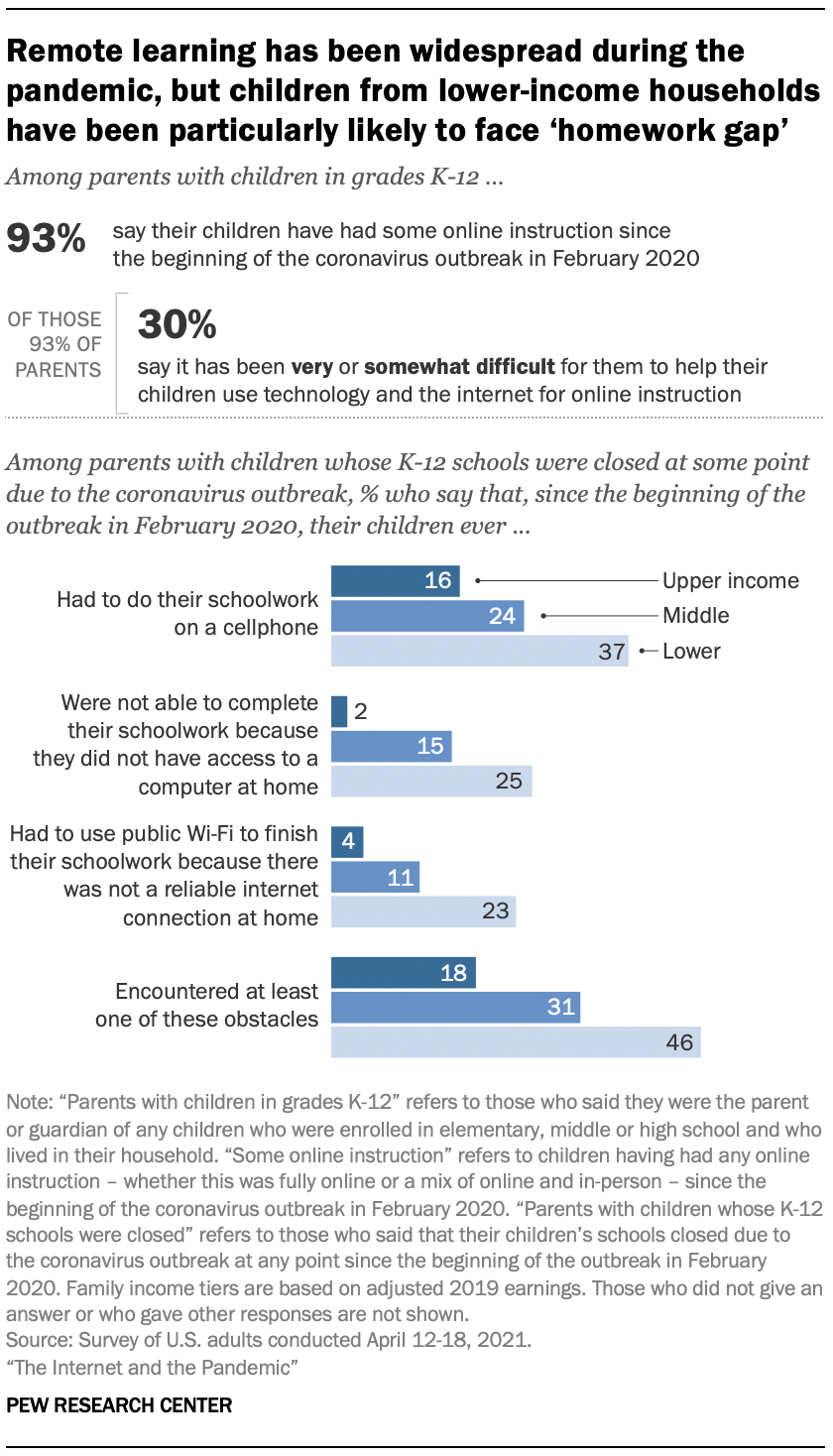
The survey also shows that children from households with lower incomes who faced school closures in the pandemic have been especially likely to encounter tech-related obstacles in completing their schoolwork – a phenomenon contributing to the “ homework gap .”
Overall, about a third (34%) of all parents whose children’s schools closed at some point say their children have encountered at least one of the tech-related issues we asked about amid COVID-19: having to do schoolwork on a cellphone, being unable to complete schoolwork because of lack of computer access at home, or having to use public Wi-Fi to finish schoolwork because there was no reliable connection at home.
This share is higher among parents with lower incomes whose children’s schools closed. Nearly half (46%) say their children have faced at least one of these issues. Some with higher incomes were affected as well – about three-in-ten (31%) of these parents with midrange incomes say their children faced one or more of these issues, as do about one-in-five of these parents with higher household incomes.
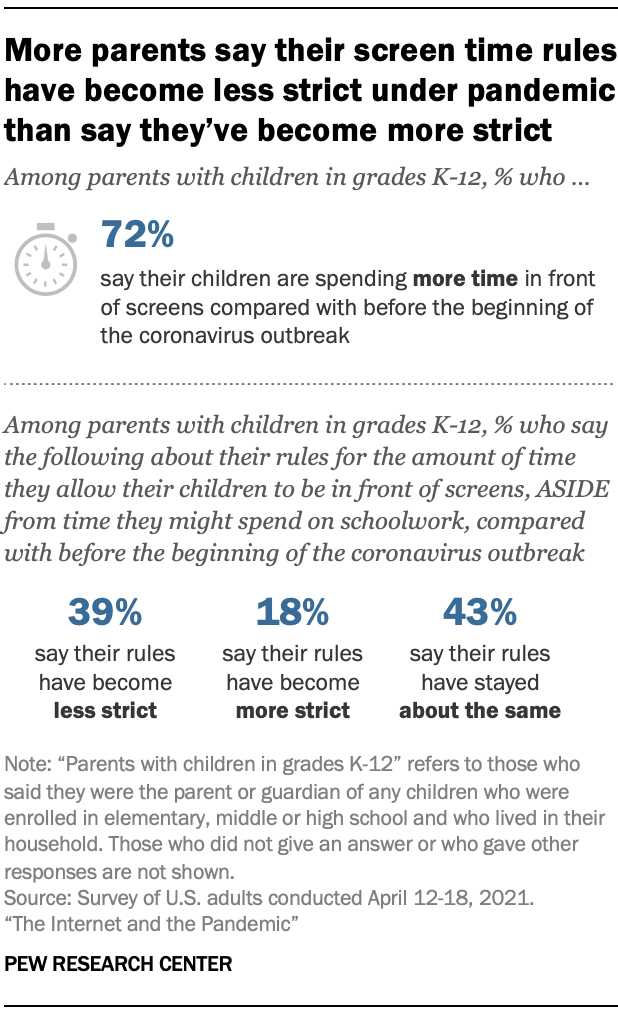
Prior Center work has documented this “ homework gap ” in other contexts – both before the coronavirus outbreak and near the beginning of the pandemic . In April 2020, for example, parents with lower incomes were particularly likely to think their children would face these struggles amid the outbreak.
Besides issues related to remote schooling, other changes were afoot in families as the pandemic forced many families to shelter in place. For instance, parents’ estimates of their children’s screen time – and family rules around this – changed in some homes. About seven-in-ten parents with children in kindergarten through 12th grade (72%) say their children were spending more time on screens as of the April survey compared with before the outbreak. Some 39% of parents with school-age children say they have become less strict about screen time rules during the outbreak. About one-in-five (18%) say they have become more strict, while 43% have kept screen time rules about the same.
More adults now favor the idea that schools should provide digital technology to all students during the pandemic than did in April 2020
Americans’ tech struggles related to digital divides gained attention from policymakers and news organizations as the pandemic progressed.
On some policy issues, public attitudes changed over the course of the outbreak – for example, views on what K-12 schools should provide to students shifted. Some 49% now say K-12 schools have a responsibility to provide all students with laptop or tablet computers in order to help them complete their schoolwork during the pandemic, up 12 percentage points from a year ago.
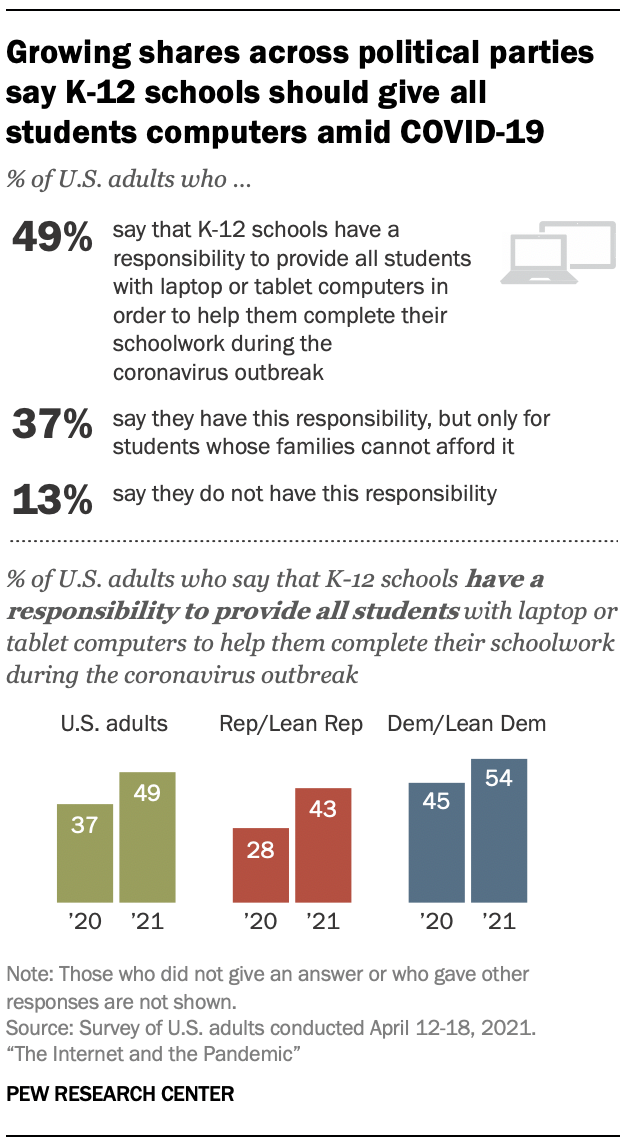
The shares of those who say so have increased for both major political parties over the past year: This view shifted 15 points for Republicans and those who lean toward the GOP, and there was a 9-point increase for Democrats and Democratic leaners.
However, when it comes to views of policy solutions for internet access more generally, not much has changed. Some 37% of Americans say that the government has a responsibility to ensure all Americans have high-speed internet access during the outbreak, and the overall share is unchanged from April 2020 – the first time Americans were asked this specific question about the government’s pandemic responsibility to provide internet access. 4
Democrats are more likely than Republicans to say the government has this responsibility, and within the Republican Party, those with lower incomes are more likely to say this than their counterparts earning more money.
Video calls and conferencing have been part of everyday life
Americans’ own words provide insight into exactly how their lives changed amid COVID-19. When asked to describe the new or different ways they had used technology, some Americans mention video calls and conferencing facilitating a variety of virtual interactions – including attending events like weddings, family holidays and funerals or transforming where and how they worked. 5 From family calls, shopping for groceries and placing takeout orders online to having telehealth visits with medical professionals or participating in online learning activities, some aspects of life have been virtually transformed:
“I’ve gone from not even knowing remote programs like Zoom even existed, to using them nearly every day.” – Man, 54
“[I’ve been] h andling … deaths of family and friends remotely, attending and sharing classical music concerts and recitals with other professionals, viewing [my] own church services and Bible classes, shopping. … Basically, [the internet has been] a lifeline.” – Woman, 69
“I … use Zoom for church youth activities. [I] use Zoom for meetings. I order groceries and takeout food online. We arranged for a ‘digital reception’ for my daughter’s wedding as well as live streaming the event.” – Woman, 44
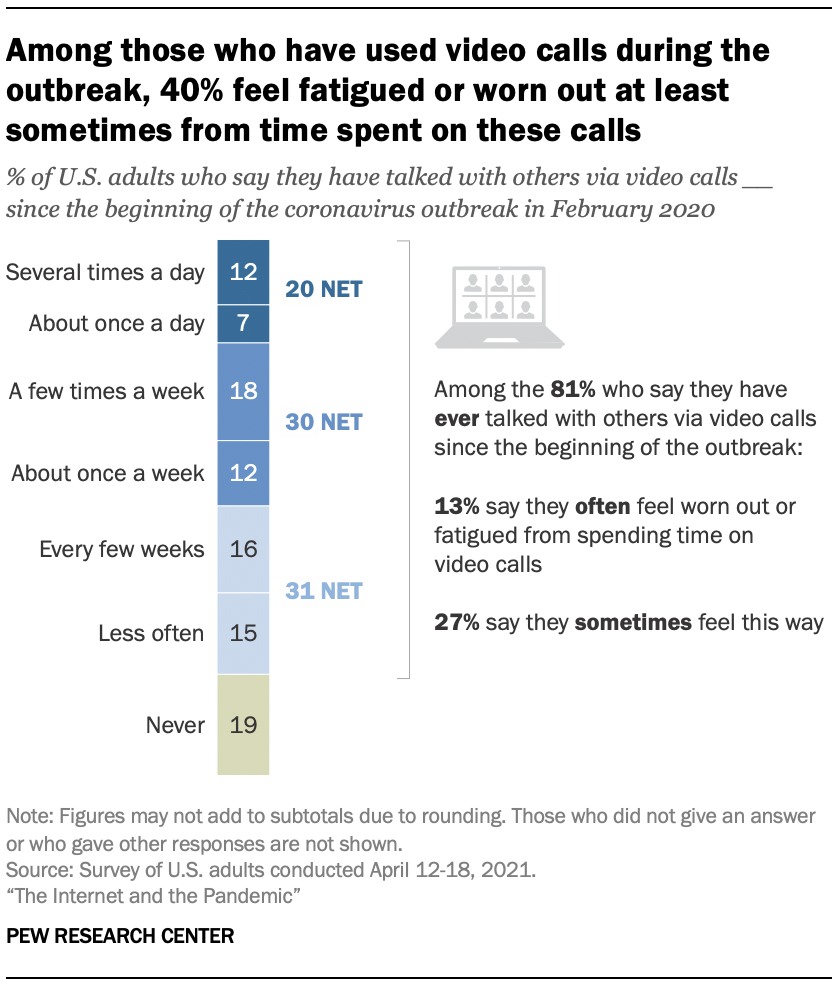
When asked about video calls specifically, half of Americans report they have talked with others in this way at least once a week since the beginning of the outbreak; one-in-five have used these platforms daily. But how often people have experienced this type of digital connectedness varies by age. For example, about a quarter of adults ages 18 to 49 (27%) say they have connected with others on video calls about once a day or more often, compared with 16% of those 50 to 64 and just 7% of those 65 and older.
Even as video technology became a part of life for users, many accounts of burnout surfaced and some speculated that “Zoom fatigue” was setting in as Americans grew weary of this type of screen time. The survey finds that some 40% of those who participated in video calls since the beginning of the pandemic – a third of all Americans – say they feel worn out or fatigued often or sometimes from the time they spend on video calls. About three-quarters of those who have been on these calls several times a day in the pandemic say this.
Fatigue is not limited to frequent users, however: For example, about a third (34%) of those who have made video calls about once a week say they feel worn out at least sometimes.
These are among the main findings from the survey. Other key results include:
Some Americans’ personal lives and social relationships have changed during the pandemic: Some 36% of Americans say their own personal lives changed in a major way as a result of the coronavirus outbreak. Another 47% say their personal lives changed, but only a little bit. About half (52%) of those who say major change has occurred in their personal lives due to the pandemic also say they have used tech in new ways, compared with about four-in-ten (38%) of those whose personal lives changed a little bit and roughly one-in-five (19%) of those who say their personal lives stayed about the same.
Even as tech helped some to stay connected, a quarter of Americans say they feel less close to close family members now compared with before the pandemic, and about four-in-ten (38%) say the same about friends they know well. Roughly half (53%) say this about casual acquaintances.
The majority of those who tried to sign up for vaccine appointments in the first part of the year went online to do so: Despite early problems with vaccine rollout and online registration systems , in the April survey tech problems did not appear to be major struggles for most adults who had tried to sign up online for COVID-19 vaccines. The survey explored Americans’ experiences getting these vaccine appointments and reveals that in April 57% of adults had tried to sign themselves up and 25% had tried to sign someone else up. Fully 78% of those who tried to sign themselves up and 87% of those who tried to sign others up were online registrants.
When it comes to difficulties with the online vaccine signup process, 29% of those who had tried to sign up online – 13% of all Americans – say it was very or somewhat difficult to sign themselves up for vaccines at that time. Among five reasons for this that the survey asked about, the most common major reason was lack of available appointments, rather than tech-related problems. Adults 65 and older who tried to sign themselves up for the vaccine online were the most likely age group to experience at least some difficulty when they tried to get a vaccine appointment.
Tech struggles and usefulness alike vary by race and ethnicity. Americans’ experiences also have varied across racial and ethnic groups. For example, Black Americans are more likely than White or Hispanic adults to meet the criteria for having “lower tech readiness.” 6 Among broadband users, Black and Hispanic adults were also more likely than White adults to be worried about paying their bills for their high-speed internet access at home as of April, though the share of Hispanic Americans who say this declined sharply since April 2020. And a majority of Black and Hispanic broadband users say they at least sometimes have experienced problems with their internet connection.
Still, Black adults and Hispanic adults are more likely than White adults to say various technologies – text messages, voice calls, video calls, social media sites and email – have helped them a lot to stay connected with family and friends amid the pandemic.
Tech has helped some adults under 30 to connect with friends, but tech fatigue also set in for some. Only about one-in-five adults ages 18 to 29 say they feel closer to friends they know well compared with before the pandemic. This share is twice as high as that among adults 50 and older. Adults under 30 are also more likely than any other age group to say social media sites have helped a lot in staying connected with family and friends (30% say so), and about four-in-ten of those ages 18 to 29 say this about video calls.
Screen time affected some negatively, however. About six-in-ten adults under 30 (57%) who have ever made video calls in the pandemic say they at least sometimes feel worn out or fatigued from spending time on video calls, and about half (49%) of young adults say they have tried to cut back on time spent on the internet or their smartphone.
- Throughout this report, “parents” refers to those who said they were the parent or guardian of any children who were enrolled in elementary, middle or high school and who lived in their household at the time of the survey. ↩
- People with a high-speed internet connection at home also are referred to as “home broadband users” or “broadband users” throughout this report. ↩
- Family incomes are based on 2019 earnings and adjusted for differences in purchasing power by geographic region and for household sizes. Middle income is defined here as two-thirds to double the median annual family income for all panelists on the American Trends Panel. Lower income falls below that range; upper income falls above it. ↩
- A separate Center study also fielded in April 2021 asked Americans what the government is responsible for on a number of topics, but did not mention the coronavirus outbreak. Some 43% of Americans said in that survey that the federal government has a responsibility to provide high-speed internet for all Americans. This was a significant increase from 2019, the last time the Center had asked that more general question, when 28% said the same. ↩
- Quotations in this report may have been lightly edited for grammar, spelling and clarity. ↩
- There were not enough Asian American respondents in the sample to be broken out into a separate analysis. As always, their responses are incorporated into the general population figures throughout this report. ↩
Sign up for our weekly newsletter
Fresh data delivery Saturday mornings
Sign up for The Briefing
Weekly updates on the world of news & information
- Business & Workplace
- Coronavirus (COVID-19)
- COVID-19 & Technology
- Digital Divide
- Education & Learning Online
A look at small businesses in the U.S.
A look at black-owned businesses in the u.s., 2023 saw some of the biggest, hardest-fought labor disputes in recent decades, do you tip more or less often than the average american, diversity, equity and inclusion in the workplace, most popular, report materials.
- American Trends Panel Wave 88
901 E St. NW, Suite 300 Washington, DC 20004 USA (+1) 202-419-4300 | Main (+1) 202-857-8562 | Fax (+1) 202-419-4372 | Media Inquiries
Research Topics
- Email Newsletters
ABOUT PEW RESEARCH CENTER Pew Research Center is a nonpartisan fact tank that informs the public about the issues, attitudes and trends shaping the world. It conducts public opinion polling, demographic research, media content analysis and other empirical social science research. Pew Research Center does not take policy positions. It is a subsidiary of The Pew Charitable Trusts .
© 2024 Pew Research Center
Home — Essay Samples — Information Science and Technology — Internet — The Impact Of The Internet On Society’s Everyday Life
The Impact of The Internet on Society's Everyday Life
- Categories: Impact of Technology Internet
About this sample

Words: 2577 |
13 min read
Published: Feb 8, 2022
Words: 2577 | Pages: 6 | 13 min read
- Amichai-Hamburger, & Zack Hayat – computers in human behavior, 2011.
- Glor, Jeff. ‘‘Cyberbullying Continued After Teens Death.’’ New York, NY: CBS Interactive Inc. March 29, 2010. Web.
- LM Hinman –Ethics and information technology , 2002-researchgate.net
- Kumar, M. (2011). Impact of the evolution of smart phones in education technology and its application in technical and professional studies: Indian perspective. International Journal of Managing Information Technology (IJMIT), 3(3), 39-49.
- Phillip EN Howard, Lee Rainie, Steve Jones – American behavioral scientist 45 (3), 383 -404, 2001 Retrieved 24 January 2020, from http://www.internetlivestats.com/
Should follow an “upside down” triangle format, meaning, the writer should start off broad and introduce the text and author or topic being discussed, and then get more specific to the thesis statement.
Provides a foundational overview, outlining the historical context and introducing key information that will be further explored in the essay, setting the stage for the argument to follow.
Cornerstone of the essay, presenting the central argument that will be elaborated upon and supported with evidence and analysis throughout the rest of the paper.
The topic sentence serves as the main point or focus of a paragraph in an essay, summarizing the key idea that will be discussed in that paragraph.
The body of each paragraph builds an argument in support of the topic sentence, citing information from sources as evidence.
After each piece of evidence is provided, the author should explain HOW and WHY the evidence supports the claim.
Should follow a right side up triangle format, meaning, specifics should be mentioned first such as restating the thesis, and then get more broad about the topic at hand. Lastly, leave the reader with something to think about and ponder once they are done reading.

Cite this Essay
Let us write you an essay from scratch
- 450+ experts on 30 subjects ready to help
- Custom essay delivered in as few as 3 hours
Get high-quality help

Dr. Heisenberg
Verified writer
- Expert in: Information Science and Technology

+ 120 experts online
By clicking “Check Writers’ Offers”, you agree to our terms of service and privacy policy . We’ll occasionally send you promo and account related email
No need to pay just yet!
Related Essays
4 pages / 1753 words
4 pages / 1965 words
2 pages / 991 words
3 pages / 1445 words
Remember! This is just a sample.
You can get your custom paper by one of our expert writers.
121 writers online
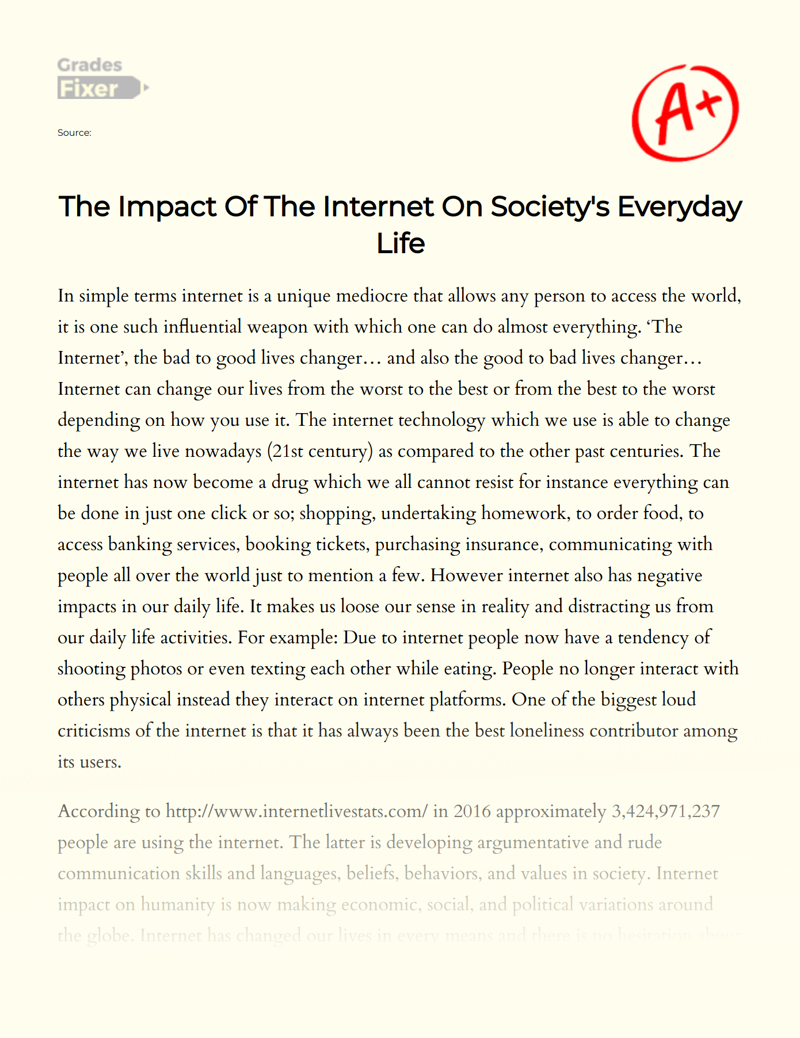
Still can’t find what you need?
Browse our vast selection of original essay samples, each expertly formatted and styled
Related Essays on Internet
Cyber security can be defined as security measures being applied to computers to provide a desired level of protection from external cyberattacks. The issue of protection can be defined using the acronym CIA for Confidentiality, [...]
The Internet has become an integral part of modern life, shaping the way we access information, interact with others, and process knowledge. It has revolutionized the way we think and make decisions. In this essay, we will [...]
We value our net neutrality, fighting for it in 2015 and winning against internet service providers (ISPs) such as AT&T, Verizon, Comcast, to name a few. However, the FCC (or ISPs) not backing down fought to end net [...]
The Internet of Things (IoT) has revolutionized the way we interact with technology, transforming our daily lives in countless ways. This essay aims to provide an in-depth exploration of the importance, impact, benefits, [...]
Monovm is a web VPS (Virtual Private Server) hosting service company that has their server situated and operates in the whole of USA, UK, Canada and six other countries. It ensures that an individual is granted access to a well [...]
American writer, Nicholas Carr’s article, Is Goggle Making Us Stupid, conceives the idea that the net is changing the way our brains receive information. He tries to convince the reader by provoking fear through anecdotes and [...]
Related Topics
By clicking “Send”, you agree to our Terms of service and Privacy statement . We will occasionally send you account related emails.
Where do you want us to send this sample?
By clicking “Continue”, you agree to our terms of service and privacy policy.
Be careful. This essay is not unique
This essay was donated by a student and is likely to have been used and submitted before
Download this Sample
Free samples may contain mistakes and not unique parts
Sorry, we could not paraphrase this essay. Our professional writers can rewrite it and get you a unique paper.
Please check your inbox.
We can write you a custom essay that will follow your exact instructions and meet the deadlines. Let's fix your grades together!
Get Your Personalized Essay in 3 Hours or Less!
We use cookies to personalyze your web-site experience. By continuing we’ll assume you board with our cookie policy .
- Instructions Followed To The Letter
- Deadlines Met At Every Stage
- Unique And Plagiarism Free

Essay on Role of Internet in Education
Students are often asked to write an essay on Role of Internet in Education in their schools and colleges. And if you’re also looking for the same, we have created 100-word, 250-word, and 500-word essays on the topic.
Let’s take a look…
100 Words Essay on Role of Internet in Education
Introduction.
The internet has revolutionized many aspects of our lives, including education. It provides a vast array of resources and opportunities for learning.
Access to Information
The internet is a treasure trove of information. It makes research easier, faster, and more convenient for students.
Online Learning
Through the internet, students can access online courses and tutorials. They can learn at their own pace, anytime, anywhere.
Collaboration and Communication
The internet facilitates collaboration and communication among students and teachers. It allows for easier sharing of ideas and knowledge.
In conclusion, the internet plays a crucial role in education. It provides access to information, enables online learning, and facilitates communication and collaboration.
250 Words Essay on Role of Internet in Education
The advent of the internet has revolutionized various sectors, including education. This transformational tool has reshaped the way knowledge is disseminated, making education more accessible, flexible, and diversified.
Enhancing Accessibility
The internet has broken down geographical barriers in education. It allows students from any part of the world to access educational resources online, attend virtual classes, and even pursue degree programs remotely. This democratization of education has particularly benefited individuals in remote areas and those with physical disabilities.
Facilitating Flexibility
Traditional education systems often require students to adapt to fixed schedules, which may not accommodate everyone’s unique circumstances. The internet, however, offers a more flexible approach, enabling learners to study at their own pace and time. This flexibility is crucial for working students, adult learners, or anyone juggling multiple responsibilities.
Promoting Diversification
The internet has also contributed to the diversification of learning materials. Students can now learn from a variety of sources, including e-books, podcasts, videos, and interactive simulations. This diversity caters to different learning styles and can make education more engaging and effective.
In conclusion, the role of the internet in education cannot be overstated. By enhancing accessibility, facilitating flexibility, and promoting diversification, it has transformed the educational landscape. As we continue to embrace digital technology, it is essential to harness its potential to further improve and democratize education.
500 Words Essay on Role of Internet in Education
Democratizing education.
The internet has democratized education by making it accessible to a wider audience. Online learning platforms, Massive Open Online Courses (MOOCs), and virtual classrooms have broken down geographical barriers, enabling individuals from remote areas or those with limited mobility to access quality education. The internet has also fostered inclusivity, providing learning opportunities for diverse learners with varied learning styles and paces.
Facilitating Real-Time Interaction
The internet has facilitated real-time interaction between students and educators, fostering a more engaging and collaborative learning environment. Tools such as video conferencing, chat forums, and interactive whiteboards enable direct communication, immediate feedback, and collaborative problem-solving. This not only enhances the learning experience but also fosters critical thinking and teamwork skills.
Enhancing Resources and Learning Materials
Promoting lifelong learning.
The internet promotes a culture of lifelong learning. With the rapid pace of technological advancement and the ever-evolving job market, continuous learning has become a necessity. The internet provides a platform for upskilling and reskilling, offering courses on a wide range of subjects, from coding to philosophy. This flexibility allows individuals to adapt to changing career demands and pursue personal interests.
Challenges and Future Perspectives
Despite its numerous benefits, the role of the internet in education also presents challenges. Issues such as digital divide, online safety, and the quality of online education need to be addressed. Furthermore, the impersonal nature of online learning can lead to feelings of isolation and lack of motivation.
In conclusion, the internet plays a pivotal role in education, transforming it into a more accessible, interactive, and resource-rich space. While challenges exist, the potential benefits are immense. As we continue to navigate the digital age, it is crucial to harness the power of the internet to enhance education and foster a culture of lifelong learning.
That’s it! I hope the essay helped you.
If you’re looking for more, here are essays on other interesting topics:
Happy studying!
Leave a Reply Cancel reply
Your email address will not be published. Required fields are marked *

IMAGES
VIDEO
COMMENTS
The presence of the Internet is slowly replacing the use of traditional newspapers. It offers various recreational advantages as well. It can be correctly said that the internet plays a great role in the enhancement of quality of life. Also Read: TOEFL Sample Essays. Sample Essay 3 on Use of Internet for Student (300 Words)
Essay on Internet in 250-400 words. The Internet has become an indispensable part of our lives, transforming the way we communicate, access information, and conduct business. It is a vast network of interconnected computers and servers that enables the sharing and exchange of data worldwide.
We live in the age of the internet. And, it has become an important part of our life. Besides, internet is an invention of high-end science and modern technology. Apart from that, we are connected to internet 24x7. In this essay on Internet, we are going to discuss various things related to the internet.
The Internet has turned our existence upside down. It has revolutionized communications, to the extent that it is now our preferred medium of everyday communication. In almost everything we do, we use the Internet. Ordering a pizza, buying a television, sharing a moment with a friend, sending a picture over instant messaging.
7060. Today, the internet is one of the most powerful tools in the world. Everywhere you go, and in today's society, the internet is a major part of everyone's life, whether it is school, business, or entertainment. The term "internet," according to the dictionary, is "a system of connected computers that allows computer users around the ...
The Role Of Computers And Internet In Our Lives essay 100, 150, 200, 250 words in English helps the students with their class assignments, comprehension tasks, and even for competitive examinations. You can also find more Essay Writing articles on events, persons, sports, technology and many more.
In a nutshell, the Internet plays a crucial role in our lives. It's essential for education, communication, and services. Also check: Paragraph on Importance of Internet; 250 Words Essay on Importance of Internet The Lifeline of Modern Society: The Internet.
Our current "network society" is a product of the digital revolution and some major sociocultural changes. One of these is the rise of the "Me-centered society," marked by an increased ...
The Impact of The Internet. The internet has revolutionized the way we communicate and has become an essential tool in the modern world. Before its advent, communication was limited to small radius networks, but with the laying of the first cable in the United Kingdom in the 1850s and 1860s, the groundwork for the internet was laid.
Get a custom essay on The Impact of the Internet in Culture and Daily Habits. This paper analyzes the impact of the internet in our daily lives through habits formed and how it has shaped our culture today. We will be examining both the positive and negative effects brought about by the internet in shaping the modern society and culture today ...
Physics. Get Started. We live in the age of the internet. And, it has become an important part of our life. Besides, internet is an invention of high-end science and modern technology. Apart from that, we are connected to internet 24x7. In this essay on Internet, we are going to discuss various things related to the internet.
In conclusion, the internet has had a huge impact on our lives. It has made learning, communication, work, and entertainment easier and more accessible. It has truly transformed our lives. 250 Words Essay on Impact Of Internet On Our Life Introduction. The internet has changed our lives in many ways. It has become a big part of our daily routine.
The internet has revolutionized the way individuals access information. The following are some of the personal benefits of the internet: Access to information: The internet offers a wide range of resources that provide individuals with access to a wealth of information. Research materials, academic papers, journals, and educational videos are ...
Essay on Internet. Introduction The Internet is a system of interconnection of computer networks that link several billion devices worldwide. It is a global network of networks that consists of millions of non-public, public, academic, business and government packet switched networks, joined by a broad array of electronic, wireless and optical ...
The Changes That the Internet Has Brought to Our Lives. Internet is definitely a boon when utilized in a proper way. Firstly, the internet has played a very significant role by providing endless information and knowledge about any topic using search engines like Google Chrome, YouTube, and many more.Students are very much benefited as the internet gives them a broader understanding and ...
For all its contradictions, 2020's impact on the Internet has been a rapid acceleration of trends already in motion. The Internet became a virtual lifeline, giving people vital health information and access to medical care. It allowed people to telework and enabled businesses to stay afloat through online sales.
The Internet is the world's largest communication and a network connecting millions of computer users. It is of great help for everyone as it has reduced work as well as the stress of people. The importance of the internet in our tech lives is similar to oxygen to us people. Moreover, the Internet is an invention of top-of-the-range science ...
Download. Essay, Pages 2 (421 words) Views. 18220. In contemporary society, the internet has become an integral part of our daily routine, playing a pivotal role in connecting individuals and networks worldwide. The internet, also known as the World Wide Web, stands as one of the most revolutionary and indispensable technological advancements ...
Results from a new Pew Research Center survey of U.S. adults conducted April 12-18, 2021, reveal the extent to which people's use of the internet has changed, their views about how helpful technology has been for them and the struggles some have faced. The vast majority of adults (90%) say the internet has been at least important to them ...
Introduction: In simple terms internet is a unique mediocre that allows any person to access the world, it is one such influential weapon with which one can do almost everything. 'The Internet', the bad to good lives changer… and also the good to bad lives changer… Internet can change our lives from the worst to the best or from the best to the worst depending on how you use it.
Examining the Internet in Everyday Life 1. Barry Wellman, Anabel Quan -Haase, Jeffrey Boase, and Wenhong Chen. Centre for Urban and Community Studies, University of Toronto. [email protected] ...
Essay on Importance Of Internet; Paragraph on Importance Of Internet in 250 Words. The Internet is very important in our daily lives. It is like a big library where we can find information about anything in the world. Students use it to do their homework, read books, and learn new things. Even teachers use it to prepare their lessons and share ...
In conclusion, the internet plays a crucial role in education. It provides access to information, enables online learning, and facilitates communication and collaboration. 250 Words Essay on Role of Internet in Education Introduction. The advent of the internet has revolutionized various sectors, including education.